May Paninindigan

Diskriminasyon sa mga Miyembro ng LGBTQ (Lesbian, Gay, Bisexual, Trans-Gender at Queer) sa Pilipinas
Isinulat ni: brixter m. lanot.
Halos lahat ng miyembro ng LGBTQ ay nakararanas ng hindi patas na pagtrato dahil sa kanilang pagkilos at maging sa kanilang katangian. Sa madaling salita ito ay tinatawag na “Diskriminasyon”. Nararanasan nila ito sa kanilang eskwelahan, sa kanilang komunidad, at ang ilan ay mismong sa kanilang tahanan. Ayon sa Human Rights Watch (2017), ang diskriminasyong nararanasan ng mga miyembro ng LGBTQIA ay humahantong rin sa bullying at ang mas malala pa ay sa mga pisikal na pananakit. Ang mga pang –aabusong katulad nito ay maaari ding humantong sa mas mataas na lebel ng depresyon at pagkabalisa na posibleng magdulot ng suicide at iba pang hindi magandang bagay. Nakakaalarma ang ganitong mga pangyayari sapagkat mismong mga opisyal ng gobyerno ay ginagawa ang diskriminasyon sa mga miyembro ng LGBTQ. Ayon kay Edgar T. (2017) sinabi ni Senador Manny Pacquiao na hindi raw tao ang mga miyembro ng LGBTQ at dapat na lamang na pabayaan.
Ayon kay Aenlle (2017) pumasa na sa ikalawang pagbasa ang House Bill 4982 na siyang magpoprotekta at lalaban sa diskriminasyong nararanasan ng mga miyembro ng LGBTQ . Ngunit ang batas man na ito ay maganda sa papel, hindi pa rin naman ito napapatupad ng husto. Dapat lamang na matutukan ng husto ang laban sa diskriminasyon at hindi lamang maisapapel ang mga ganitong uri ng patakaran sapagkat tayong lahat ay pantay pantay lamang at walang karapatang itrato ang iba ng hindi maganda anuman ang kanilang kasarian.
Sa isinulat na artikulo ni Marquez (2015), mayroon ng mga naipatupad na batas para labanan ang diskriminasyon at protektahan ang mga miyembro ng LGBTQ. Mga batas na tutulong bawasan at mapigilan ang pang-aabuso ng iba sa kanila. Nakasaad sa artikulo ng Human Rights Watch (2017) na habang patuloy ang pagpapatupad ng mga batas laban sa diskriminasyon, dapat pa ring siguraduhin na ang mga patakarang ito ay maayos na naipatutupad sapagkat sa kasalukuyan, sa pagdami ng miyembro ng LGBTQ community sabay rin dito ang mga pang-aapi at pang-aabuso nilang nararanasan.
Kaugnay sa isinaad ng Human Rights Watch (2017), ayon kay Thoreson (undated), may ilang guro rin naman na sumasali rin sa hindi magandang pagtrato sa mga estudyanteng miyembro ng LGBTQ sa halip na sa kanila dapat mismo manggaling ang pagtuturo laban sa diskriminasyon at iba pang klase ng pang-aabuso.Nakasaad din sa artikulo ni Thoreson (undated) na sa mga nakapanayam nilang estudyante marami ang nagsasabi na ang mga kasalukuyang batas laban sa diskriminasyon sa mga miyembro LGBTQ ay hindi regular at hindi napatutupad ng wasto.Ilan rin sa mga eskwelahang sekondarya ay nakakasanayan ang diskriminasyon at hindi nabibigyan ng suporta at kaalaman ang mga estudyanteng miyembro ng LGBTQ tungkol sa kanilang mga karapatan.
Inilahad ni Carlos M. (2017), isang miyembro ng LGBTQ na siya ay nakaranas ng pisikal na pang-aabuso at diskriminasyon sa kanya mismong pinapasukan na eskwelahan. Ayon sa kanya, tuwing matatapos ang klase, susundan siya ng ilan sa kanyang mga kaklase at siya ay itinutulak, sinusuntok at sinasaktan ng pisikal. Bukod pa doon, tinatawag rin siyang “bakla” sa hindi magandang paraan at nakaranas din siya ng sexual harassment galing sa kanila.Idinagdag pa ni Carlos na dahil halos estudyante lahat ang may pakana ng mga pang-aabuso ay binabalewala na rin lamang ito ng kanyang mga guro na nagdulot din ng diskriminasyon galing mismo sa mga guro. Bukod kay Carlos, nakaranas rin si Benjie A. (2017) ng mga diskriminasyon noong siya ay nag –aaral pa. Ayon sa kanya, biktima siya ng bullying, hindi niya alam ang kasarian niya at pakiramdam niya na walang nagmamahal sa kanya. Ang masama pa rito, umisip na siya ng mga paraan kung paano kitilin ang sarili niyang buhay.
Marami ng patakaran ang ipinatutupad laban sa diskriminasyon ngunit halos lahat ng ito ay hindi natututukan at naipatutupad ng maayos. Karamihan sa mga miyembro ng LGBTQ na biktima ng diskriminasyon ay naghahanap ng suporta galing sa kanilang eskwelahan pati na rin sa kanilang pamilya. Ang tanging kaso rito ay hindi sapat ang kanilang kaalaman ukol sa mga komunidad ng LGBTQ .
Ayon sa aking nabasa, nakonsidera ng seryoso ang pagtutok ng pamahalaan sa pagpapatupad ng mga batas ukol sa diskriminasyon sa mga miyembro ng LGBTQ. Ngunit kung tunay itong seryoso, bakit hindi ito ipinatutupad ng maayos at napakarami pa rin ang nabibiktima ng mga pang-aabusong pisikal at sekswal sa mga myembro ng komunidad ng LGBTQ. Ang ilan naman ay mismong mga opisyal pa ng gobyerno ang nagpapasimuno ng mga hindi pantay na pagtrato sa kanila.
Halimbawa na lamang nito ay ang mga gurong mismong nang-aapi sa mga estudyanteng miyembro ng LGBT. Matataas ang kanilang pinag-aralan ngunit ipinapakita nila ang pagiging mangmang sa kanilang ginagawa. Ano nga ba ang tunay na dahilan kung bakit nila ito ginagawa? Maging ilang mga relihiyosong pastor ay ginagawa rin ang diskriminasyon sa mga myembro ng LGBTQ. Ayon sa kanila Lalaki at Babae lamang ang nilikha ng Panginoon. Ngunit pantay pantay tayong lahat sa mata ng Diyos. Ano man ang kasarian, kabutihan ng kalooban ang tinitingnan ng Diyos sa atin.
Bukod pa doon, pare pareho tayo ng nasyonalidad. Ang dapat nating gawin ay respetohin at suportahan ang isa,t-isa. Wala ni isa sa atin ang may karapatan na manakit at husgahan ang ibang tao base sa kanilang katangian lalong lalo na sa pamamagitan ng kanilang kasarian.
Dapat lamang na tutukan ang laban sa diskriminasyon sa mga miyembro ng LGBTQ dahil pare-pareho tayong tao at higit sa lahat pare pareho tayong Pilipino. Wala tayong sapat na dahilan upang hindi itrato ng maganda ang iba. At sa ating pamahalaan, nararapat din lamang na ipatupad nila ng maayos ang mga batas na kanilang ipinapasa. Nararapat rin na hindi gamitin ng sinumang opisyal ng gobyerno ang kanilang posisyon upang manlamang sa iba. Pagdating naman sa mga eskwelahan, dapat na magbigay ng mga kaalaman sa mgaestudyante ukol sa mga karapatan ng bawat isa at karapatan ng mga miyembro ng LGBTQ.
Sanggunian:
Click to access philippines0617tagalog_summandrecs.pdf
https://mdepacina.wordpress.com/2016/11/18/batas-para-sa-komunidad-ng-lgbt/
https://www.beyondblue.org.au/who-does-it-affect/lesbian-gay-bi-trans-and-intersex-lgbti-people/the-impact-of-discrimination
Ibahagi ito:
Published by Loli King
Tignan lahat ng post ni Loli King
Mag-iwan ng puna Pindutin ito para bawiin ang tugon.

- Already have a WordPress.com account? Log in now.
- I-Customize
- Magpahatid Naipahatid
- Mag-sign up
- Copy shortlink
- Report this content
- View post in Reader
- Manage subscriptions
- Collapse this bar
Talumpati Tungkol Sa LGBTQ
Banderang bahaghari.
by: Talumpati.info
S a henerasyon ngayon, laganap ang salitang “LGBT” sa mga usap-usapan at kontrobersiya. Ito ay pinag-uusapan sa social media, sa balita, at maging sa mga tao mismo sa paligid. Ang LGBT ay inisyal ng lesbiyan, bakla, biseksuwal, at mga transgender.
Ito ay isang komunidad nila na kung saan pinapalaganap, pinapahalagahan, at pinaglalaban nila ang kanilang mga karapatan sa buhay.
Noong unang panahon, ang mga taong parte ng LGBT community ay ginagawang katatawanan lamang. Kung ikaw ay bakla, wala kang ibang natatanggap kundi diskriminasyon at pang-aapi mula sa lipunan.
Ngunit ngayon, marami ng LGBT na winawagayway ang kanilang bandera at ipinagmamalaki kung sino sila.
Subalit, hindi pa rin mawawala ang diskriminasyon at panlalait na natatanggap nila sa lipunan, at lubos pa rin silang di katanggap-tanggap ng mga ito.
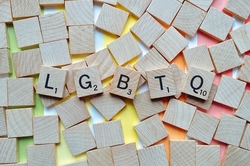
Ang pagiging isang LGBT ay hindi isang sakit na kailangan natin lubayan at hanapan ng lunas, sapagkat kailangan natin silang tanggapin, respetuhin, unawain, at mahalin tulad ng pagmamahal natin sa iba. Dahil kagaya mo, tao rin sila.
Iba Pang Talumpati
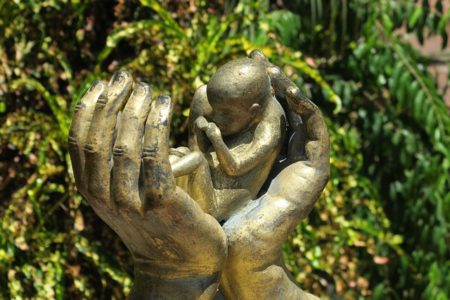
Bata, Paano Ka Ginawa? by: Talumpati.info Bilang isang Kristiyano at konserbatibong bansa, sagrado at mabigat ang usapin tungkol sa abortion….
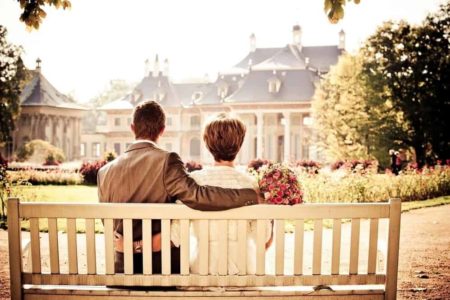
Kabiyak Ng Puso by: Talumpati.info Kapag ang iyong puso ay puno ng pag-ibig, tiyak na kapayapaan at kasiyahan ang sa…
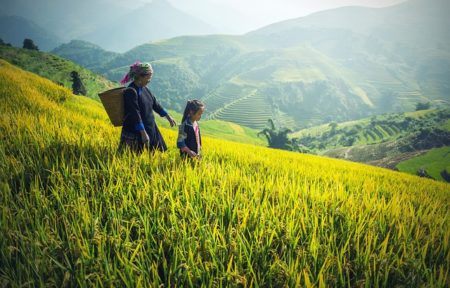
Rice Tariffication Law
Bawat Isang Butil by: Talumpati.info
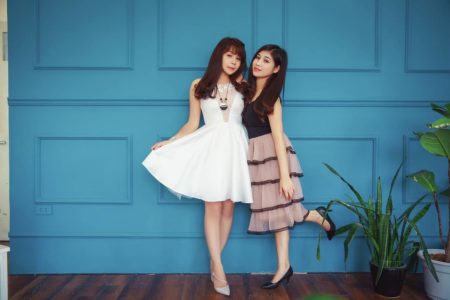
Pakikipagrelasyon ng Kabataan
“Ang Tamang Oras” by: Talumpati.info Sa henerasyon ng kabataan ngayon, mapapansin ang maagang pagtalamak ng kabataan sa pakikipagrelasyon. Hayskul pa…
Leave a Comment Cancel reply


Lesbian, gay, bisexual and transgender (LGBT) Filipinos continue to experience stigma, prejudice and discrimination in Philippine society. This stigma is manifested in actions such as: bullying, teasing and harassment of LGBT children and adolescents in families, schools and communities; media portrayal of LGBTs as frivolous, untrustworthy and even dangerous or predatory; denying transgender Filipinos entry into commercial establishments; pigeonholing LGBT Filipinos into particularly limited roles and occupations; or curtailing their rights to participate in the political sphere.
LGBT Filipinos often confront social pressures to hide, suppress or even attempt to change their identities and expressions as conditions for their social acceptance and enjoyment of rights. Although many LGBTs learn to cope with this social stigma, these experiences can cause serious psychological distress, including immediate consequences such as fear, sadness, alienation, anger and internalized stigma (Hatzenbuehler, 2009; Meyer, 2003). This anti-LGBT prejudice and discrimination tend to be based on a rhetoric of moral condemnation and are fueled by ignorance or unfounded beliefs associating these gender expressions and sexual orientations with psychopathology or maladjustment.
However, decades of scientific research have led mental health professional organizations worldwide to conclude that lesbian, gay and bisexual orientations are normal variants of human sexuality. These include: the American Psychiatric Association in 1973, the American Psychological Association in 1975, British Psychological Society, the Colombian Society of Psychology, Psychological Society of South Africa, the Australian Psychological Society, and the International Network on Lesbian, Gay and Bisexual Concerns and Transgender Issues in Psychology, among others.
The Psychological Association of the Philippines (PAP) aligns itself with the global initiatives to remove the stigma of mental illness that has long been associated with diverse sexualities and to promote the wellbeing of LGBT people. Moreover, the PAP Code of Ethics (2010) is clear in its stance against discrimination. Filipino psychologists are called upon to recognize the unique worth and inherent dignity of all human beings; and to respect the diversity among persons and peoples (Principle I, a and b). This means that Filipino psychologists should not discriminate against or demean persons based on actual or perceived differences in characteristics including Philippine Journal of Psychology, 2011, 44 (2), 229-230 Copyright @ 2011 Psychological Association of the Philippines gender identity and sexual orientation (Ethical Standard III-A and C; V-B.8). In order to eliminate stigma, prejudice, discrimination and violence against LGBT, the PAP resolves to support efforts to:
- oppose all public and private discrimination on the basis of actual or perceived sexual orientation, gender identity and expression;
- repeal discriminatory laws and policies, and support the passage of legislation at the local and national levels that protect the rights and promote the welfare of people of all sexual orientations and gender identities and expressions;
- eliminate all forms of prejudice and discrimination against LGBTs in teaching, research, psychological interventions, assessment and other psychological programs;
- encourage psychological research that addresses the needs and concerns of LGBT Filipinos and their families and communities;
- disseminate and apply accurate and evidence-based information about sexual orientation and gender identity and expression to design interventions that foster mental health and wellbeing of LGBT Filipinos.
References
American Psychiatric Association. (1973). Position statement on homosexuality and civil rights. American Journal of Psychiatry, 131; 497. Anton, B.S. (2009). Proceedings of the American Psychological Association for the legislative year 2008: Minutes of the annual meeting of the Council of Representatives, February 22-24, 2008, Washington, DC, and August 13 and 17, 2008, Boston, MA, and minutes of the February, June, August, and December 2008 meetings of the Board of Directors. American Psychologist, 64; 372-453. Conger, J.J. (1975). Proceedings of the American Psychological Association, Incorporated, for the year 1974: Minutes of the annual meeting of the Council of Representatives. American Psychologist, 30; 620-651. Hatzenbuehler, M. L. (2009). How does sexual minority stigma “get under the skin”? A psychological mediation framework. Psychological Bulletin, 135; 707-730. International Network for Lesbian, Gay and Bisexual Concerns and Transgender Issues in Psychology (2001). Sexual orientation and mental health: Toward global perspectives on practice and policy. Retrieved from http://www.apa.org/ pi/lgbt/resources/international-meeting.pdf Meyer, I. H. (2003).Prejudice, social stress, and mental health in lesbian, gay, and bisexual populations: Conceptual issues and research evidence. Psychological Bulletin, 129; 674-697. Psychological Association of the Philippines Scientific and Professional Ethics Committee. (2010). Code of Ethics for Philippine Psychologists. Philippine Journal of Psychology, 43; 195-217.
- [email protected]
- +632 8244-90-53
- +63 915 422 5189 - Globe
- +63 947 571 7629 - Smart
- Certified Specialists
- Special Awards and Grants
- Publications
- Registration
PUBLIC ADVISORY
Hi Members! , Kindly Note that the registration and login for www.pap.ph are now redirected to www.portal.pap.ph. For our valued members, please login your credentials like you would before and proceed to your account update.
If problems occur, please contact: [email protected] Thank you.
Please click "I have read and understood" to bring you to the login/registration page.
Decoder: How ‘Bakla’ Explains the Struggle for Queer Identity in the Philippines
Create an FP account to save articles to read later and in the FP mobile app.
ALREADY AN FP SUBSCRIBER? LOGIN
World Brief
- Editors’ Picks
- Africa Brief
China Brief
- Latin America Brief
South Asia Brief
Situation report.
- Flash Points
- War in Ukraine
- Israel and Hamas
- U.S.-China competition
- Biden's foreign policy
- Trade and economics
- Artificial intelligence
- Asia & the Pacific
- Middle East & Africa
Reimagining Globalization
Fareed zakaria on an age of revolutions, ones and tooze, foreign policy live.

Spring 2024 Issue
Print Archive
FP Analytics
- In-depth Special Reports
- Issue Briefs
- Power Maps and Interactive Microsites
- FP Simulations & PeaceGames
- Graphics Database
The Atlantic & Pacific Forum
Redefining multilateralism, principles of humanity under pressure, fp global health forum 2024, fp at nato’s 75th summit.
By submitting your email, you agree to the Privacy Policy and Terms of Use and to receive email correspondence from us. You may opt out at any time.
Your guide to the most important world stories of the day
Essential analysis of the stories shaping geopolitics on the continent
The latest news, analysis, and data from the country each week
Weekly update on what’s driving U.S. national security policy
Evening roundup with our editors’ favorite stories of the day
One-stop digest of politics, economics, and culture
Weekly update on developments in India and its neighbors
A curated selection of our very best long reads
How ‘Bakla’ Explains the Struggle for Queer Identity in the Philippines
The tagalog word eludes western concepts of gender and sexuality—and offers a window into lgbtq+ filipinos’ quest for acceptance..
- Human Rights
- Southeast Asia
Pride Month in the Philippines this year was decidedly spirited: Emerging from one of the longest COVID-19 lockdowns in the world, tens of thousands of people flocked to events organized by advocacy groups throughout the country to protest abuses against members of the LGBTQ+ and other marginalized communities, stand up for human rights, exchange ideas, watch speeches and performances, provide mutual support, and revel in one another’s company. “Happy Pride, mga bakla !” (“Happy Pride, queers!”) was a common refrain, charged with a celebratory energy that has not always been present for queer Filipinos.
But despite being home to the first Pride March in Asia and some of the largest pride celebrations in the region since, the Philippines has a long way to go in terms of ensuring the safety and dignity of LGBTQ+ Filipinos, who have few legal protections and are often targets of aggression, even brutality . An anti-discrimination bill has languished in the legislature for around two decades. Police periodically conduct raids , without warrants, of venues frequented by queer people, who are then subjected to verbal abuse, extortion, and unlawful detention.
The Tagalog word bakla might be seen as an index of the struggles that LGBTQ+ Filipinos still deal with. Although it serves as a marker of identity and as a potential means of forging community, the term is also burdened by an oppressive past that shapes its unsettled present.
There have been efforts to reclaim bakla from its pejorative past—resembling, to some degree, efforts to transform “queer” from a slur into a badge of affirmation.
Variously translated as “drag queen,” “gay,” “hermaphrodite,” “homosexual,” “queer,” “third sex,” and “transgender,” bakla shows how in the Philippines, as in many places around the world, gender and sexuality are imagined and lived out in connection with concepts and categories that Western lenses can’t fully account for. Even as LGBTQ+ discourse has taken root in the Philippines, providing queer Filipinos and their peers around the world with a shared language to build solidarity with, it is inevitably inflected by local understandings of personhood. In his landmark study of Philippine gay culture, literary critic J. Neil Garcia notes that the defining characteristic of the bakla has been—and, to a large extent, continues to be—effeminacy rather than the object of the bakla’s sexual desire. Thus, bakla refers more to gender than to sexuality. However, in popular usage, it is liable to encapsulate both.
Among Filipinos, bakla likely first conjures up the image of a man who wears clothes and makeup meant for women and is predisposed to flamboyant speech and mannerisms. This figure of the effeminate man has long been present in the Philippines. Documents dating back to the 16th century during Spanish colonization allude to people known as, among other things, “ asog ”: men who assumed the appearance and behavior of women to such a degree that an observer would have difficulty distinguishing between an asog and a woman.
Asog and their ilk throughout the archipelago engaged in what might be most accurately described as gender-crossing. For all practical purposes, they were treated as women, and they married and had sexual relations with men. Like women, asog were well respected in early colonial—and, presumably, pre-colonial—Philippine society. Only women and asog could take on the prestigious role of “ babaylan ,” mediating between the human and the spirit worlds, treating the sick and wounded, and acting as religious and political leaders.
In spite of Filipinos’ subversion, resistance, and hostility, agents of Spanish subjugation endeavored to overhaul Indigenous people’s ways of life. Notably, members of the Catholic clergy branded sexual acts outside of marriage between a man and a woman as sinful and unnatural. Over some 300 years, babaylan lost their spiritual authority to the Catholic Church, women were relegated to the confines of the home or convent, and asog found themselves demeaned by society and ridiculed as bakla.
Some of the definitions for “ bacla ,” an earlier spelling, in an 1860 Tagalog-Castilian dictionary are telling: to beguile or deceive with luster or beauty, to heal with feigned words, and to be frightened of a new thing. In Tagalog writings from the 19th century up to before World War II, bakla signified a passing phase of confusion, cowardice, fear, indecision, or weakness. Although the word is no longer used in these ways, bakla still bristles with a host of negative connotations, especially following its conflation with the (male) homosexual. Following Garcia’s account, this conflation can be traced back to around the turn of the 20th century, when the United States acquired the Philippines from Spain and imposed new modes of thought about gender and sexuality—such as the concept of homosexuality and its pathologization as a disorder.
A Filipino protester holds up a painted sign at dusk that reads “ Fight 4 Intersectional LGBTQ+ ” during a Pride parade and protest in Manila, Philippines, on June 28. Jes Aznar/Getty Images
Thus, it is not surprising that bakla today is still used as an insult. Former Philippine President Rodrigo Duterte, notorious for his penchant for violence, has denounced several of his critics as bakla, from a rival candidate for president to the chairperson of the Commission on Human Rights to the U.S. ambassador to the Philippines . Duterte has also remarked on a number of occasions that he used to be bakla but “ nagamot ko ang sarili ko ” (“I cured myself”)—giving voice to the conventional belief in the country that being bakla is similar to having a disease.
This stigma manifests in other forms. Consider how the relationship between two celebrities, comedian Vice Ganda and model Ion Perez, has played out in the public eye. Ganda has referred to herself as bakla and nonbinary, with no pronoun preferences. Perez has described himself as a straight man and responded with anger when tagged as bakla. In 2021, to mark their third anniversary as a couple, the two underwent a commitment ceremony in Las Vegas. Regardless of their open expressions of love, Vice and Perez have had to weather persistent rumors that Perez is just bilking his wealthier and more famous partner. It is a common stereotype that the bakla must purchase the affections of a man and will be abandoned once the bakla has been drained of funds or the man has fallen in love with a woman.
There has been a variety of responses to bakla and its adverse history from the people it purports to designate, such as other members of the LGBTQ+ community and their allies, from adaptation to rehabilitation to rejection. These responses are nuanced by factors like socioeconomic status, geographical location, and access to information on developments in such fields as human rights, law, mass media, medicine, psychology, and public health—and how these bear on gender and sexuality.
Bakla is used matter-of-factly as a self-descriptor and between bakla and their friends as a greeting or a term of endearment. Diminutives, such as “ baks ” and “ accla ,” proliferate, as do alternatives like “ badaf ” and “ bading ,” which are seen as less demeaning. The English words “gay” and “queer” are also in use; these must be understood in connection with long-standing inequalities in Philippine society, in that bakla tends to indicate a person of lower class and status, usually caricatured as a swishy beauty parlor worker. (Many bakla pursue careers in the beauty, fashion, or entertainment industries.)
The Connection Between LGBTQ Rights and Democracy
Inside the worldwide fight for equality.
Maria Ressa Wants to Save Journalism
The Filipino American journalist and Nobel laureate explains what it’s like to be a government target—and how to safeguard a free press.
Transgender women, meanwhile, have sought to endow their existence with greater precision than bakla affords, with a group of advocates coining the term “transpinay”—a portmanteau of “transgender” and “Pinay,” the latter an informal word for “Filipino woman”—in 2008.
Moreover, there have been efforts to reclaim bakla from its pejorative past—resembling, to some degree, efforts to transform “queer” from a slur into a badge of affirmation. In the 1980s, gay and lesbian activists set up a group named BANANA, which stood for Baklang Nagkakaisa Tungo sa Nasyonalismo (“Bakla United Toward Nationalism”), and participated in protests against the government. In the 1990s, an LGBTQ+ student organization based in the state-run University of the Philippines, called UP Babaylan—a homage to the pre-colonial shaman—produced T-shirts for its members that said “ Bakla ako ” (“I’m bakla”) on the front and “ May angal ka ?” (“Any objections?”) on the back.
A watershed moment in the 2000s was the founding of Ang Ladlad, an LGBTQ+ party that sought to influence national politics by fielding candidates to run under the Philippines’ party-list system, designed to facilitate representation of marginalized sectors in Congress. It faced several challenges —including a ban, later overturned, on its participation in the 2010 elections owing to its alleged promotion of immorality—and was ultimately unsuccessful at its bids to win legislative seats, but it helped draw attention to LGBTQ+ issues and suggest the prospect of the “pink vote”: that is, LGBTQ+ people as a key voting bloc, though its power is yet to be demonstrated. One of the more interesting vote-gathering tactics of Ang Ladlad was to visit neighborhood beauty parlors and engage with the bakla employed there.
Various LGBTQ+ groups continue to play on bakla in their slogans and taglines as they stand up for their rights. The coalition Bahaghari often uses “ Makibeki, wag mashokot !” as a rallying cry. “ Makibeki ” combines “ makibaka ” (“contend with us”) and “ beki ” (another diminutive of bakla) while “‘ wag mashokot ” means “have no fear” in gay lingo. The organizers of the Metro Manila Pride Parade also used makibeki as part of this year’s march theme: “ Atin Ang Kulayaan! Makibeki Ngayon, Atin Ang Panahon .” A rough translation would be, “The colors of freedom are ours! Fellow queers, let us fight together. It is our time.”
These, it must be emphasized, are not merely linguistic maneuvers. Rather, they represent individual and collective efforts from people who have long been disdained for being different, for defying the norm, to make themselves felt and heard, specify their experiences, and inaugurate modes of living and loving together. Even as the use of bakla remains contentious, LGBTQ+ Filipinos sustain their attempts to negotiate with its difficult history and pave the way toward a prismatic future where they will be embraced with full acceptance by their families and communities.
Jaime Oscar M. Salazar is a writer who lives in Pasig, Philippines.
Join the Conversation
Commenting on this and other recent articles is just one benefit of a Foreign Policy subscription.
Already a subscriber? Log In .
Subscribe Subscribe
View Comments
Join the conversation on this and other recent Foreign Policy articles when you subscribe now.
Not your account? Log out
Please follow our comment guidelines , stay on topic, and be civil, courteous, and respectful of others’ beliefs.
Change your username:
I agree to abide by FP’s comment guidelines . (Required)
Confirm your username to get started.
The default username below has been generated using the first name and last initial on your FP subscriber account. Usernames may be updated at any time and must not contain inappropriate or offensive language.
Sign up for Editors' Picks
A curated selection of fp’s must-read stories..
You’re on the list! More ways to stay updated on global news:
Pakistan Seeks More IMF Funding Amid Protests
Slovakian prime minister robert fico shot in assassination attempt, russia advances on kharkiv as ukraine struggles to fight back, singapore’s new pm is already worried, the changing nuclear mind game, editors’ picks.
- 1 How Steel Built the Modern Economy
- 2 The Woman Inheriting AMLO’s Revolution
- 3 Gazprom’s Declining Fortunes Spell Trouble for Moscow
- 4 The Day After Iran Gets the Bomb
- 5 China and the U.S. Are Numb to the Real Risk of War
- 6 Singapore’s New PM Is Already Worried
Slovakian Prime Minister Robert Fico in 'Life-Threatening Condition' After Assassination Attempt
Russia kharkiv offensive puts ukrainian troops in retreat, singapore's political worries won't change with new pm, russian nuclear war threats mark a new kind of mind game, more from foreign policy, saudi arabia is on the way to becoming the next egypt.
Washington is brokering a diplomatic deal that could deeply distort its relationship with Riyadh.
What America’s Palestine Protesters Should and Shouldn’t Do
A how-to guide for university students from a sympathetic observer.
No, This Is Not a Cold War—Yet
Why are China hawks exaggerating the threat from Beijing?
The Original Sin of Biden’s Foreign Policy
All of the administration’s diplomatic weaknesses were already visible in the withdrawal from Afghanistan.
The Day After Iran Gets the Bomb
Gazprom’s declining fortunes spell trouble for moscow, how steel built the modern economy.
Sign up for World Brief
FP’s flagship evening newsletter guiding you through the most important world stories of the day, written by Alexandra Sharp . Delivered weekdays.
- Philippines
Southeast Asia’s Most Gay-Friendly Country Still Has No Law Against LGBT Discrimination

A t first glance, the deeply Catholic Philippines can seem surprisingly LGBT-friendly . In a nation of 110 million people, more than 110,000 showed up last week to Quezon City’s Pride festival , making it by far the largest LGBT congregation in Southeast Asia. The country also ranks highest in the region for LGBT social acceptance —according to a 2021 global index —and it’s made significant strides over the years toward greater inclusivity and equality.
And yet, for more than two decades, a bill that would criminalize discrimination based on one’s sexual orientation, gender identity, gender expression, or sex characteristics ( SOGIESC ) has languished in the Philippines’ Congress. Year after year, it’s practically become an annual tradition for legislation on the matter to be reintroduced and rejected, leaving LGBT people in many parts of the country with no legal recourse when they’re discriminated against.
Read more: A Year After Singapore Decriminalized Gay Sex, Its LGBT Community Turns Attention to Family
While many cities across the country have already instituted local ordinances to make SOGIESC-based discrimination illegal, Irish Inoceto, a Filipino LGBT activist and former employee of the Philippine Supreme Court, tells TIME that they have “no teeth at all” and that she has seen firsthand just how overdue and glaringly necessary such a nationwide law is.
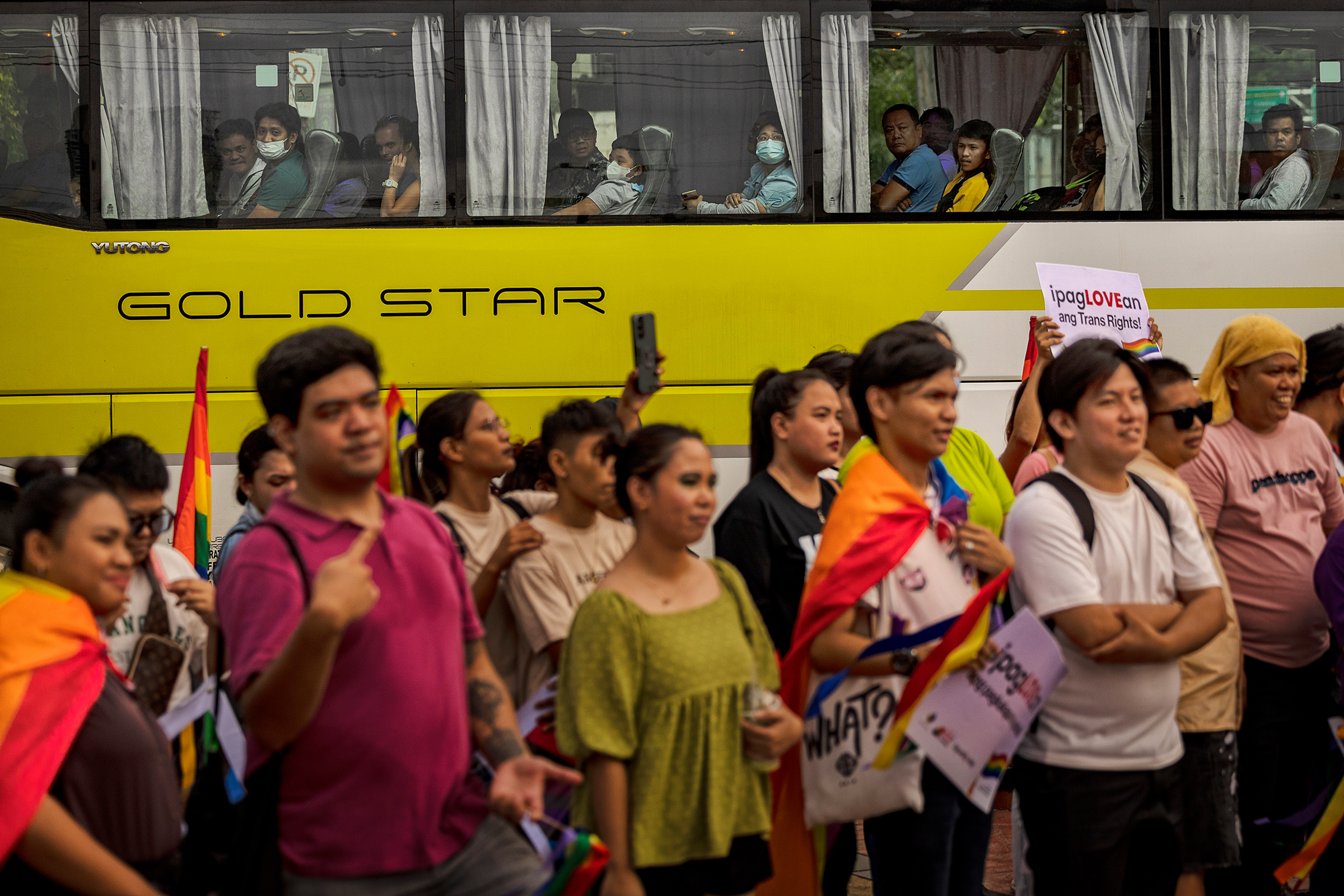
Last October, Inoceto received a message on Facebook from an 11th grader just weeks before students were to be required back in classrooms after two years of COVID-prompted remote learning . The student, a transgender woman in Iloilo City, some 280 miles southeast of Manila, had met Inoceto through one of the routine LGBT rights seminars Inoceto facilitated across Iloilo City, where she used to be based. The student, who had attended some classes in person during a hybrid-remote period, told Inoceto that the school principal summoned her personally to say that men should not wear bras; she also said a school security officer policed her uniform. Meanwhile, another student at the same school who also identifies as a transgender woman similarly reached out to Inoceto to tell her that the principal rounded up all the students in her grade and declared that bakla (gay men) with long hair must cut it or be barred from school.
“The length of my hair is not the basis for my schooling,” the latter student, who is now 19 and requested anonymity for fear of further discrimination, tells TIME.
The situation prompted Inoceto to write to the school on both students’ behalfs. She cited Iloilo City’s own anti-discrimination ordinance that passed in 2018 , but she says her letter was ignored. Only after visiting the principal in person did Inoceto ultimately prevail in getting the school to back down on its attempts to curb both students’ gender expression. Any relief for Inoceto, however, was short-lived. The ordeal thrust her into the national spotlight and set in motion a saga that would ultimately force her to flee the country, where she continues to advocate for the national anti-discrimination bill to be passed.
Inoceto, who is now 46 years old, has spent half her life watching Philippine legislators fail to create a national anti-discrimination law for the LGBT community. Legislative records show the first version of what would later come to be known as the SOGIE Equality Bill was filed in the Philippine House of Representatives on Jan. 26, 2000. Successive Congresses have seen the bill progress through the legislative process to varying degrees, only to meet the same fate: at best, the entire lower chamber might approve it, only for the upper chamber—the Philippine Senate—to let it stall in deliberations.
The most recent version of the bill in the Senate would outlaw SOGIESC-based discriminatory practices like refusing admission to or expelling a person from schools, or imposing harsher than normal disciplinary sanctions on students. If passed, violators may pay a fine as high as 250,000 Philippine pesos ($4,535) or be jailed for as long as six years.
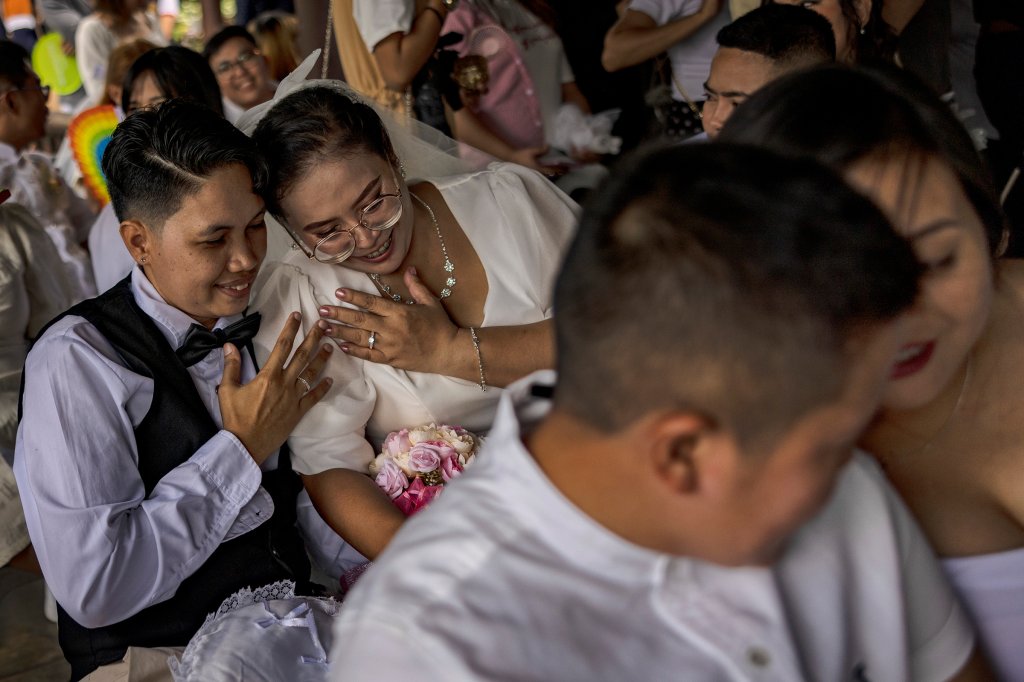
But the bill faces steep political resistance, particularly from Christian fundamentalists who, despite constituting a minority of the population compared to the Philippine’s overwhelming Catholic majority, represent a potent political force in the country : megachurches have galvanized fiercely loyal followings and fostered political power through electoral endorsements and the fielding of their own candidates.
Read more: In the Philippines, You Can Be Both Openly LGBT and Proudly Catholic. But It’s Not Easy
Opponents of the SOGIE Equality Bill have been accused of promulgating disinformation online as well as in the halls of Congress to obstruct its passage.
Two of the most vocal figures in the legislative efforts to block the bill are father and son duo Eddie and Joel Villanueva—a representative and senator, respectively. The elder Villanueva, who is also the founder of the Jesus is Lord megachurch, has describe the bill as “ imported ,” saying it doesn’t represent Filipino values, while the younger Villanueva has accused the bill of being a precursor to “ same-sex marriage .”
Reyna Valmores, chair of the Philippine LGBT rights group Bahaghari, has attended deliberations of the bill in the Philippine House as a resource person. She tells TIME the hearings can often feel like a “circus” of disinformation. “We have elected officials talking about how the SOGIE Equality Bill is going to legalize bestiality, is going to legalize having sex robots, and some other such nonsense.”
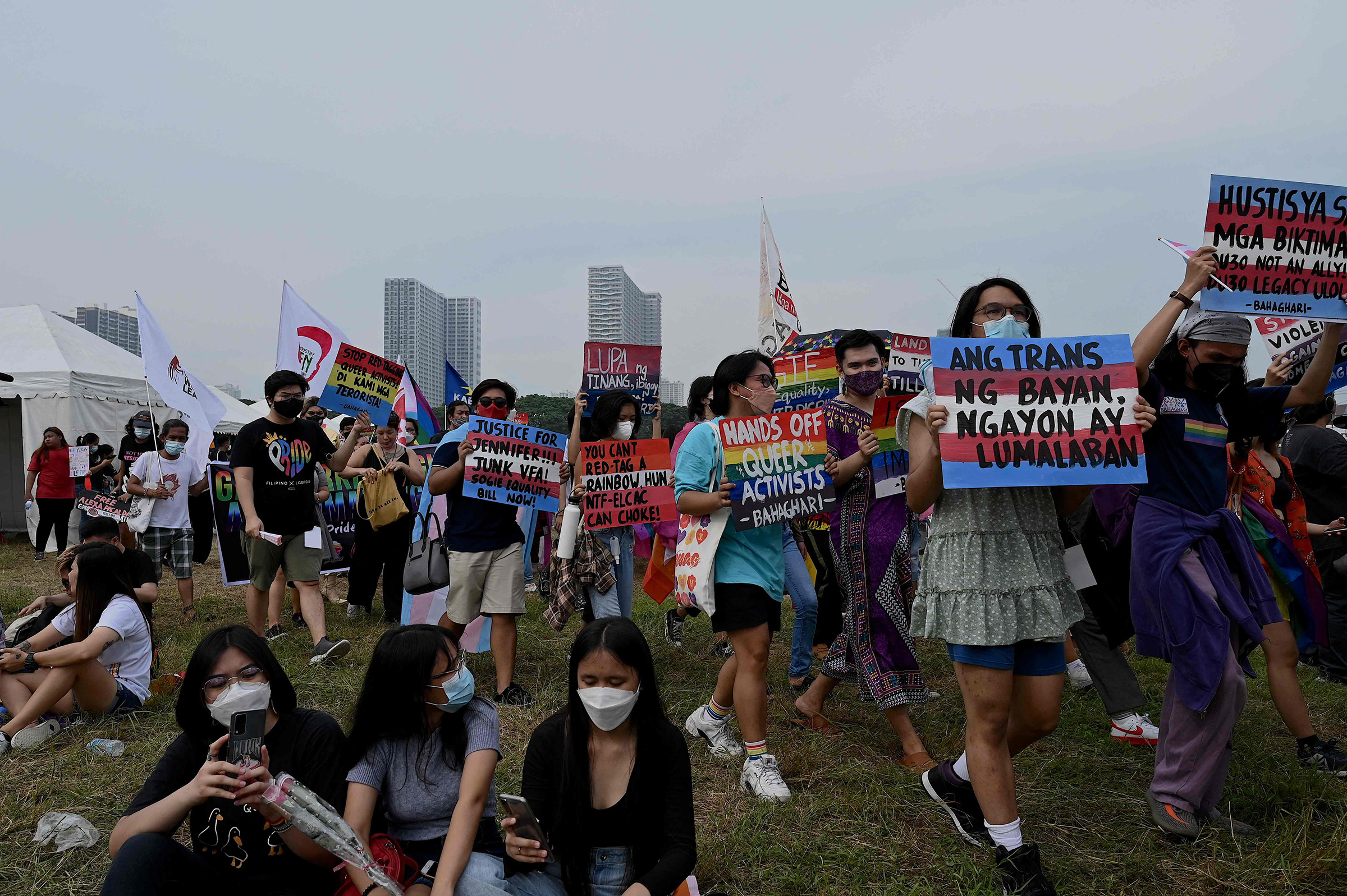
“It’s a matter of debates in Congress,” Valmores says. “But for many people, it’s a matter of survival.”
Soon after helping the two students in Iloilo City, Inoceto began to be targeted at a national scale—highlighting some of the extreme measures taken by prominent opponents of LGBT advocacy in the country.
Her name appeared in broadcasts from the Sonshine Media Network International, a television station owned by Apollo Quiboloy —a Philippine megachurch leader who is on the FBI’s most-wanted list for charges of sex trafficking women and children. Two anchors of a show on the network, Lorraine Badoy and Jeffrey “Ka Eric” Celiz, claimed that Inoceto was a member of the local communist insurgency group and has been using LGBT issues—such as her opposition to the gendered haircut policy—to recruit students from the Iloilo school. (TIME spoke to multiple students who denied that they had been recruited by Inoceto in any way.)
The sudden attention was confusing and frightening: “I’m an activist, but I’m not a big-time activist,” Inoceto tells TIME. “I work after hours and on weekends on my advocacy. So I was like, ‘Why me? And why issues on trans women students?’”
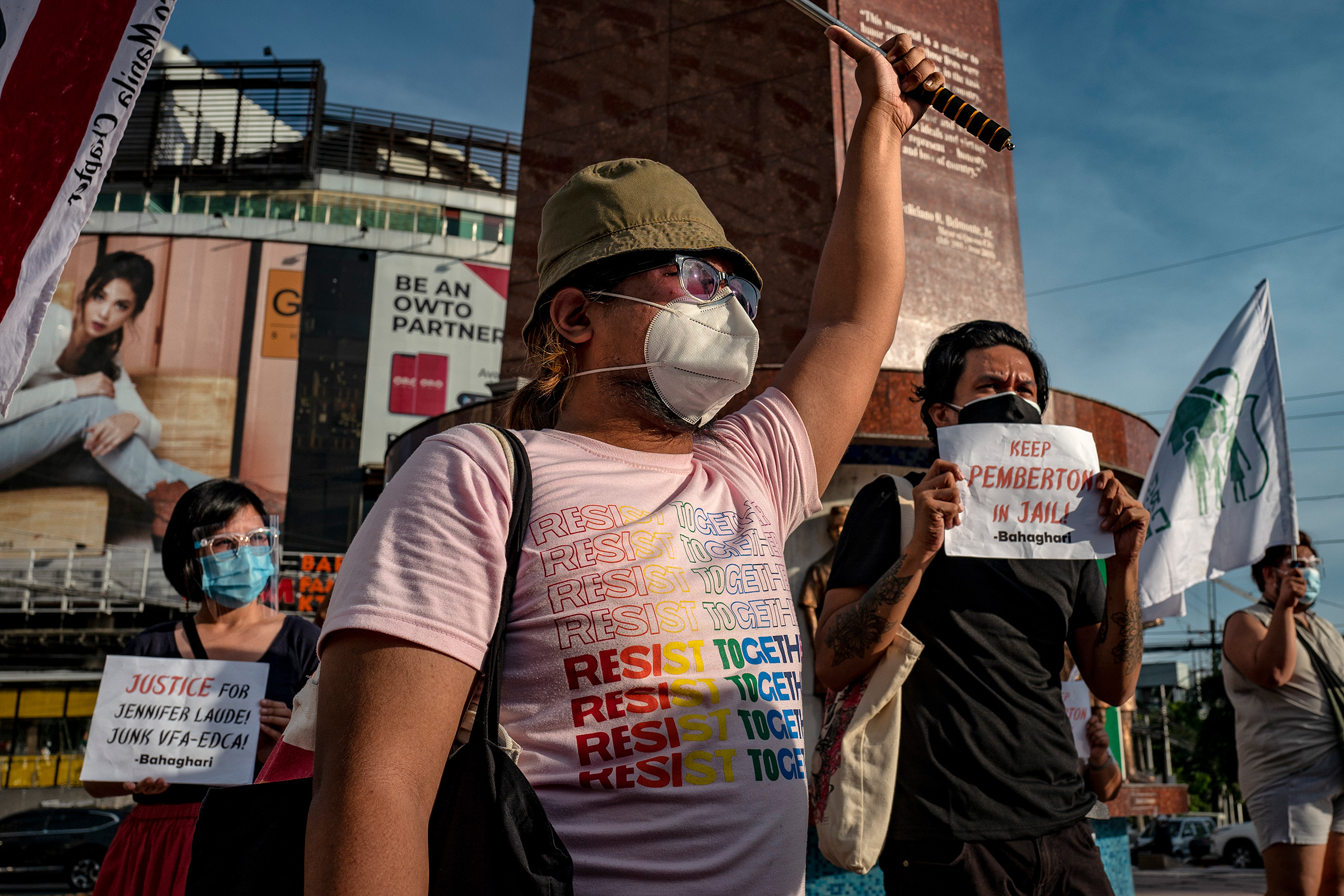
Red-tagging —a McCarthyism-like tactic of falsely labeling people as communists historically used in the Philippines to silence critics of the government, which has sometimes even led to victims being killed—has more and more been used against LGBT advocates in recent years. (Valmores from Bahaghari has also been red-tagged.)
Read more: You’ve Probably Heard of the Red Scare, Here’s the History You Didn’t Learn About the Anti-Gay ‘Lavender Scare’
After the broadcast, the country’s Commission on Human Rights issued a statement expressing concern over the anchors’ remarks, adding that the narrative they used “only serves to perpetuate the already disadvantageous plight of the LGBT who frequently face stigma, discrimination, and gender-based violence in our society.”
But that wasn’t the end of it. Inoceto saw her face posted across tarpaulins in the city, and her identity spread on social media. She even says her mother was visited by people who claimed to be police officers, asking her to stop her LGBT activism.
Concerned over the risks to her and her family’s safety, Inoceto says she applied for political asylum in France, where she is currently staying. She’s convinced that if the SOGIE Equality Bill had already been passed, she would have been protected from her harassment. “Right out the bat I was discriminated [against] because I was working towards inclusion,” she says.
Still, despite all the obstacles and dangerous disinformation wielded against the LGBT movement, Inoceto remains hopeful that the anti-discrimination bill in the Philippines will eventually pass—but not without sustained pressure put on the groups that are standing in its way. “Rights are fought for and won after so much struggle after all,” she says. “We just need to be stronger. In the meantime, we keep fighting the good fight.”
More Must-Reads From TIME
- Putin’s Enemies Are Struggling to Unite
- Women Say They Were Pressured Into Long-Term Birth Control
- What Student Photojournalists Saw at the Campus Protests
- Scientists Are Finding Out Just How Toxic Your Stuff Is
- Boredom Makes Us Human
- John Mulaney Has What Late Night Needs
- The 100 Most Influential People of 2024
- Want Weekly Recs on What to Watch, Read, and More? Sign Up for Worth Your Time
Contact us at [email protected]
By providing an email address. I agree to the Terms of Use and acknowledge that I have read the Privacy Policy .
Being gay in PH: Living life to the fullest
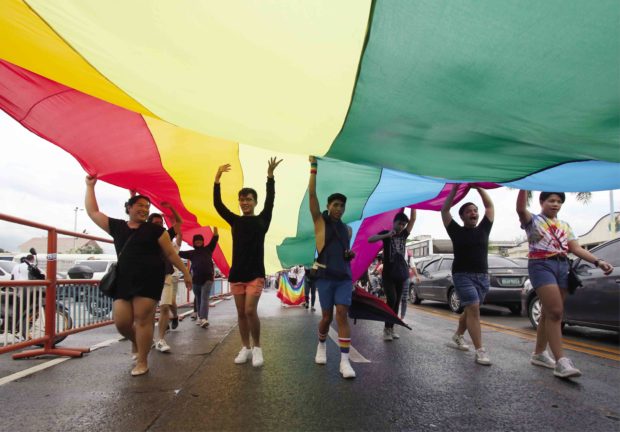
MANILA, Philippines—For many Filipinos, especially members of the LGBTQIA+ (Lesbian, Gay, Bisexual, Trans, Queer, Intersex, Asexual) community and its allies, June is known as Pride Month—a colorful month where people celebrate the long history and milestones of LGBTQIA+ visibility in the country.
Perhaps one of the key events during Pride Month in the Philippines is the Pride March which, in previous years prior to the pandemic, has gathered tens of thousands of LGBTQIA+ members and allies.
For many, Pride Month and Pride March are also not just a celebration of the LGBTQIA+ community. It is also a form of protest, a means of speaking out on the concerns of the community—especially in fighting for the rights of every member of the community, most of whom still experience discrimination and oppression because of their gender or sexual orientation.
“As a public demonstration and expression of joy, the event is both a celebration and a mass protest,” said Metro Manila Pride, a volunteer-managed, non-partisan, not-for-profit organization in the Philippines.
“Each year, we honor the Filipino LGBTQIA+ community by creating a space that uplifts and emboldens us to gather together to challenge Philippine institutions by calling for radical change,” the organization added.
“Each year we bring together individuals, organizations, and communities to call not only for equality, but for justice for the LGBTQIA+ community in the Philippines,” it continued.
The group, which organizes or oversees the annual Pride March and Festival, said that the yearly event aims to “strengthen a sense of belonging and solidarity” among LGBTQIA+ individuals in the country.
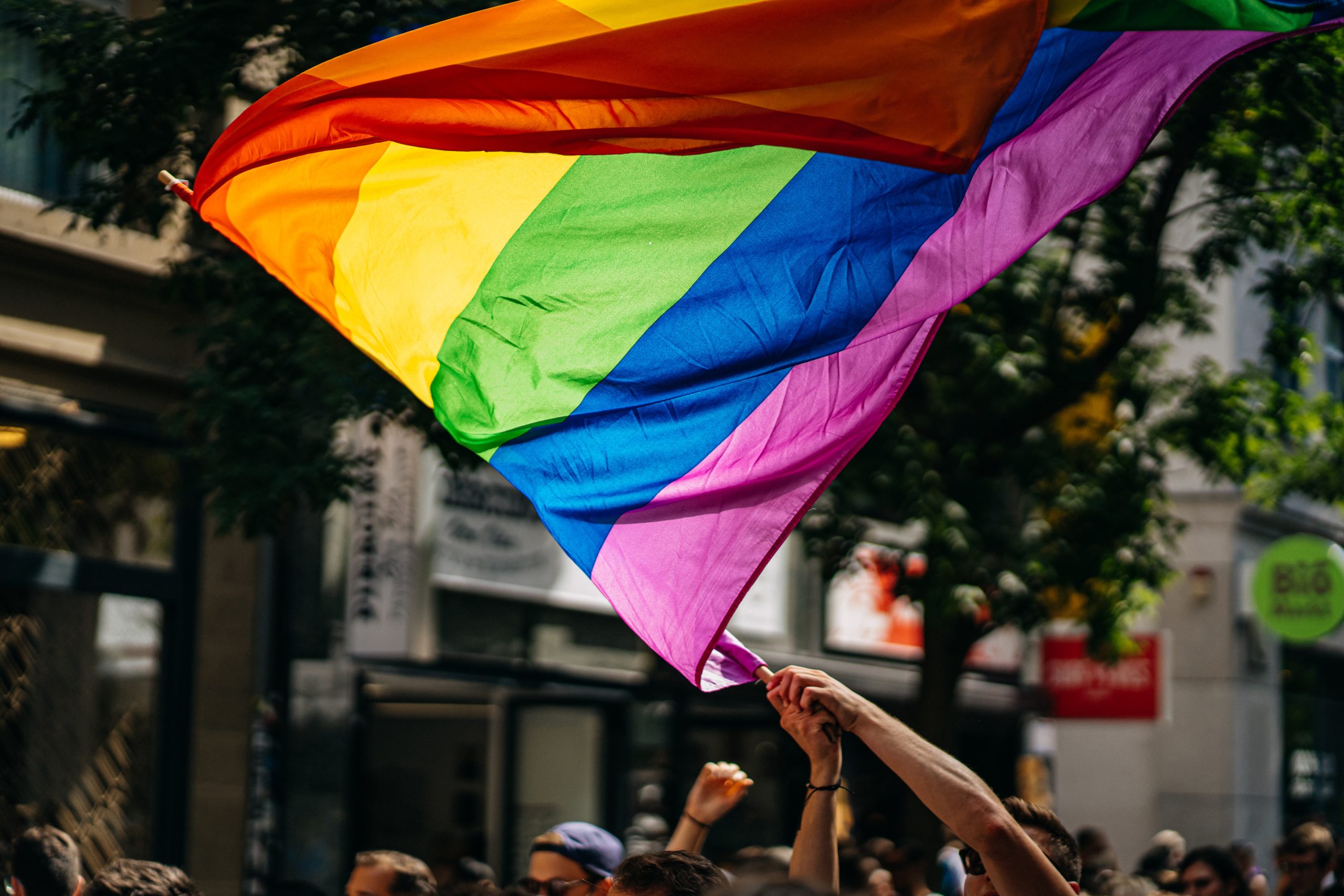
A member of the LGBTQ+ community in Stuttgart, Deutschland waves a rainbow flag. Photo courtesy of Raphael Renter via Unsplash.
Ahead of the Pride Month, in this article, INQUIRER.net talked with some members of the LGBTQIA+ community and asked them to share their thoughts on what is it like to be a member of the community in the Philippines nowadays.
They also shared more stories about the history of the community where they belong, the significance of Pride Month in their lives, the struggles still experienced by many of them, and how they try to live through it.
More opportunities for LGBTQIA+ individuals
When asked, “What is it like to be a part of the LGBTQIA+ community in the Philippines nowadays?,” Lhouric Medina—who identifies himself as a gay person—said more opportunities have opened up for members of the communities now compared to how it was years ago.
Before, according to Medina, members of the LGBTQIA+ including “crossdressers”—persons who like to wear clothing and accessories associated with the opposite sex—were given limited opportunities when applying for a job.
This was despite the fact that most, if not all, members of the LGBTQIA+ community excel and progress in their jobs or careers.
“The members of the LGBTQIA+ are usually called the ‘color of the corporate’ or ‘color of the company.’ From the highest profession of medicine down to the colorful world of cosmetology, members of the LGBTQIA+ community excel,” Medina told INQUIRER.net in an interview.
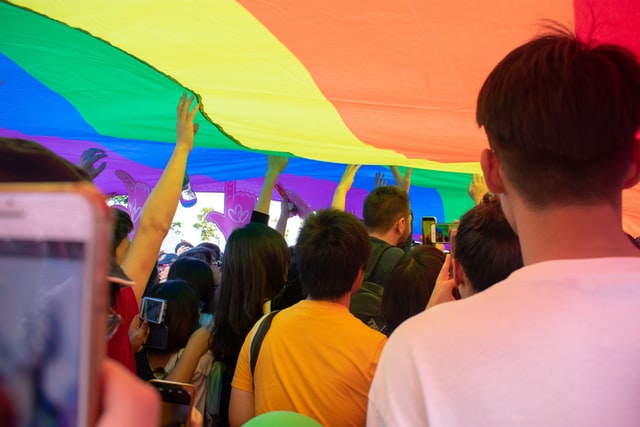
Photo courtesy of Unsplash
Years, or perhaps decades ago, there was also a popular notion among some people which associates members of the LGBTQIA+ community with a stereotypical career or job position as parloristas or hairdressers.
“That Philippine gay culture exists is an insight not very difficult to arrive at. In our country, gays may be found virtually everywhere, and what’s strange is they have a distinct quality about them which is sometimes unnerving, sometimes welcome if only that it’s funny,” said J. Neil Garcia, professor and author of many literary works including the book “Ladlad: An Anthology of Philippine Gay Writing,” in the introduction page of his other work titled “Philippine Gay Culture: Binabae to Bakla, Silahis to MSM.
“They also have their ‘haunts,’ or places in which they gather—in loud and flaming clusters inside malls, on campuses, and in the beauty parlors which are their privileged locales because they invariably work there,” Garcia said.
However, as the country becomes more open and accepting to members of the community, more opportunities have opened up for LGBTQIA+ individuals which have set their image free from the usual parlorista trope—not that there is something wrong with working in a parlor or beauty salon.
“Before, there are many opportunities that are not given to members of the LGBTQIA+ community because people think that a gay’s place is only at beauty parlors, and that gays are just dressmakers,” Medina said.
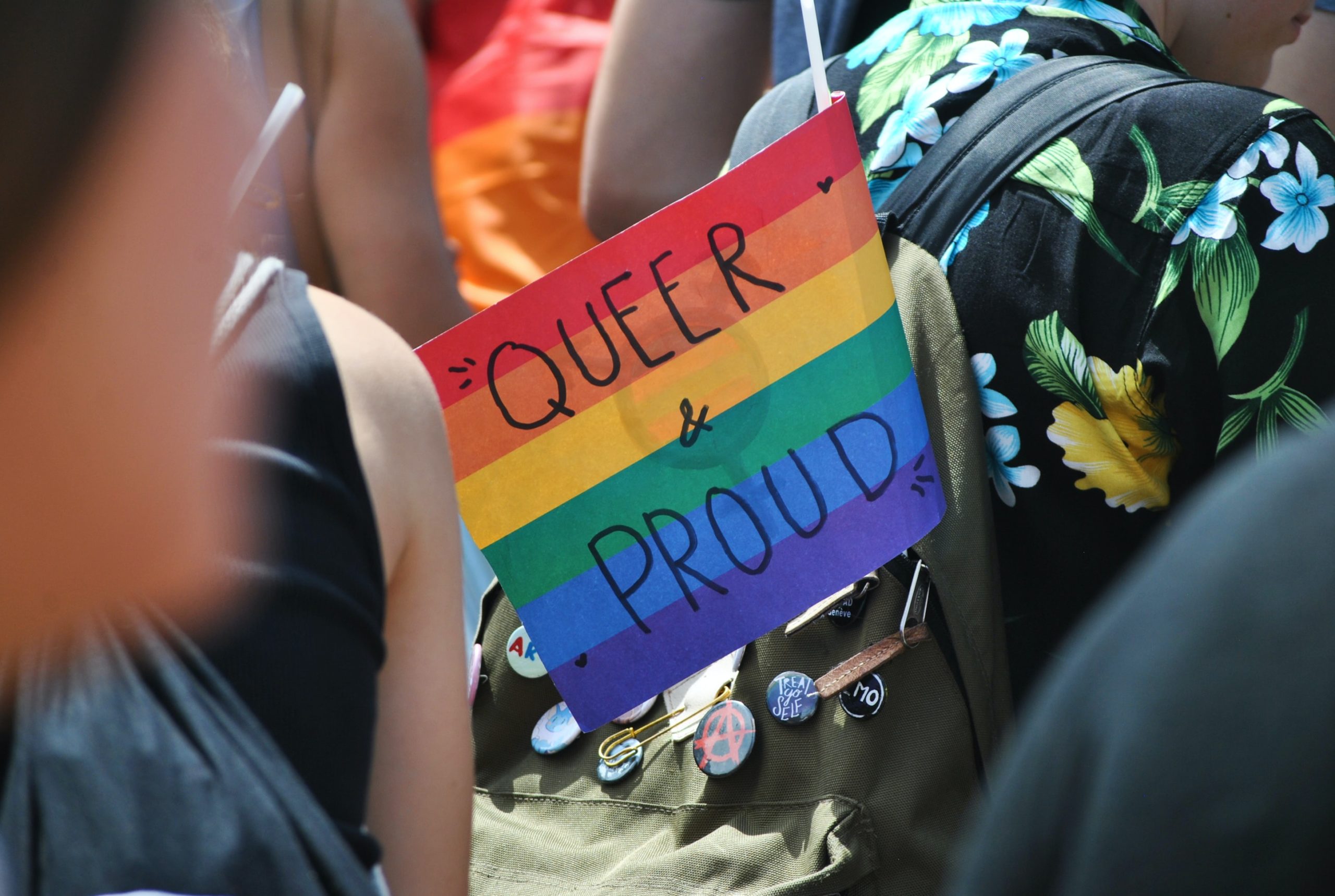
A rainbow flag that says “Queer & Proud” by a member of the LGBTQ+ community during the Pride parade in Geneva, Switzerland held in July 2019. Photo courtesy of Delia Giandeini via Unsplash.
“More opportunities have opened for people like us. When more opportunities were made available for the LGBTQIA+, we excelled,” he added.
Louder and proud
Aside from having more opportunities or career choices, one thing that Medina used to describe what is it like to be a part of the LGBTQIA+ community in the country nowadays is that they are more loud and proud of who they are.
“Compared before, gays or members of the LGBTQIA+ are louder nowadays, in terms of showing that they can do more, that they are not limited,” he said.
Medina also said he believes that discrimination among LGBTQIA+ individuals is now “very limited.”
“That is not felt strongly nowadays. There are some cases, maybe in a hundred percent, there is like 20 percent discrimination that we still feel. But when we go out of the house, we can see that people are embracing gays, LGBTQIA+ people,” Medina said.
“Before, when you go to the mall, people are staring at [us] the way [as if] they are judging [us],” he added.
They felt more open, safer—but…
Arshi, a trans-woman, said that compared to before, members of the LGBTQIA+ are now more open and out.
“Compared to way back then, the LGBTQIA+ people are now more open and out and there are a lot of safe spaces for the community and some adjust for us,” she told INQUIRER.net in a message.
Don Moya said that for him, being a gay person felt safer now compared to before. He said he believes that social media influences more people outside the LGBTQIA+ community to be more open and understanding.
“It is now much safer compared before during early high school days and below. I guess thanks to social media, people are taught to be more open about the community,” he said in a message to INQUIRER.net .
However, Arshi and Moya said the changes in how the public perceives members of their community—specifically in the Philippines—were still not completely positive.
“Here in the Philippines, it’s not easy to accept the LGBTQIA+ community as a whole because there are still close-minded people since we are known for being a religious country,” said Arshi.
“Of course, homophobia is still rampant in the country, seeing how a lot of people still use LGBT slurs as an insult and seeing a lot of old people who are still very close-minded about the topic,” Moya said.
“Sure, I believe it is indeed safer compared to before, but it’s still not safe enough for everyone. I mean, there are still families who hurt or commit violence against their gay children, right?” Moya added.
The Fuller Project—a global nonprofit newsroom dedicated to groundbreaking reports on women—said in an article published in January 2021 that around 50 transgender or gender nonbinary individuals across the Philippines have been murdered since 2010.
“[B]ut the real death toll is likely much higher,” the article stated.
A few months later, in September of that same year, Amnesty International published a report on its website on the rampant hate crimes experienced by LGBTQI+individuals in the Bangsamoro Autonomous Region in Muslim Mindanao (BARMM).
“LGBTQI+ people in the Bangsamoro Autonomous Region in Muslim Mindanao (BARMM) face pervasive discrimination, live in the constant fear of harassment, arbitrary arrest, and detention, and remain vulnerable to violence and persecution based on their sexual orientation, gender identity, and expression and sex characteristics (SOGIESC),” the report read.
In the report, Rocky Rinabor, Amnesty International Philippines Board Member and Deputy Executive Director of the Pioneer Filipino Transgender Men Movement (PFTM), said authorities in the region often turn a blind eye on the attacks against the LGBTQI+ community—a regular occurrence in the area.
“Various attacks of hate crimes and gender-based violence directed towards Muslim LGBTQI+ people in the Bangsamoro region are not new nor isolated. It is an endless cycle where queer folks, like me, are trapped, always looking over our shoulders or sleeping with one eye open,” said Rinabor.
“We are used to being caught in the middle of unlawful raids, as if they were witch hunts, in places where the LGBTQI+ are often seen – in karaoke bars, or salons and other establishments managed by trans women, often to instill fear by setting these places on fire or drive-by shootings,” Rinabor added.
“It is also common to hear stories of Muslim lesbians subjected to ‘curative rape’ in order to ‘correct’ or ‘save’ them from homosexual relationships considered to be sinful or taboo in the Muslim culture.”
According to Rinabor, these attacks continued to traumatize members of the LGBTQI+ community in the BARMM due to a lack of accountability by authorities.
“What makes it more difficult is the fact that majority of hate crimes, if not all, are not properly investigated by local authorities. It is often dealt with impunity, based on the belief that crimes directed towards queer people are justified because it is the life we choose, thus, we must accept it and just live with the consequences it brings.”

READ: Hate crimes against LGBTQI+ in BARMM must not go unpunished
Being gay, trans in the gaming world.
As casual and competitive players of online games, Arshi and Moya are part of the e-sports industry—which has been known to be a heavily male-dominated industry.
However, being a gamer and at the same time, a member of the LGBTQIA+ community has proven to be difficult for them before due to discrimination—especially when the industry was still less accommodating toward the LGBTQIA+ community.
“At the time, I was actually still closeted and kept it as a secret for almost everyone, and because of that, I didn’t get to experience it much personally but definitely the homophobia before in the gaming community was the same as it was everywhere where LGBTQ+ people were viewed as disgusting and low,” said Moya.
Arshi said that she used to get homophobic slurs and messages from “typical misogynist type” players who told him things such as “ salot [ka] sa lipunan, wag ka na mag laro , and stereotyping us [by commenting] ‘150’ [or] ‘ hala sabi ko na barbie ’ and many more.”
According to Arshi, an example would be Johnmar “OhMyV33nus” Villaluna, a Filipino e-sports player who currently plays for Blacklist International’s team for Mobile Legends: Bang Bang.
Despite leading his team to victory in many tournaments, the veteran mid laner—addressed as “Queen” by fans—remained a target of homophobic comments online.
“Maybe my best example is OhMyV33nus. Because of his popularity here in the Philippines due to his skill as a gamer, he is prone to be a target of discrimination in the gaming community,” said Arshi.
As more LGBTQIA+ players get recognized in the industry—and for their contribution and effort in breaking gender stereotypes in the e-sports industry—the LGBTQIA+ community in the industry started to gain better representation.
READ: 5 LGBTQ Pro Esports Players Breaking Through the Rainbow Glass Ceiling
As Arshi explained, the industry is “on [its] way” to becoming more open toward LGBTQI+ gamers like her and Moya.
“I can say that it’s still on the way, it’s not yet fully opened. There are some tournaments that are exclusive for gays. What about the transgenders, mostly transwomen?,” Arshi said.
“We identify ourselves as women but when there was one time when a trans joined an all-girls tournament, many people discriminated against that person. What more in big events, right?”
Moya shared the same sentiments, adding that there are still “bits of homophobia here and there.”
Discrimination and hate words are also still being thrown at gamers like them from time to time.
“In my own experience, I don’t have anyone who blatantly discriminates me in the gaming communities that I’m in as they are pretty open-minded about the community, although it’s a different story in-game,” said Moya.
“I’m pretty sure almost everyone who’s part of the LGBTQ+ community and plays games, including me, experiences discrimination a lot in-game where people say homophobic slurs to ‘trash talk’ most of the time,” he added.
Responding to discrimination
When it comes to reacting or responding to discrimination—including hateful words and homophobic slurs and comments—Moya said he just usually ignores it.
The same goes with Arshi, who said she chooses to be more understanding and be the better person.
“Not that I am being a coward, but for me, it is better to be the one who is more understanding because it’s burdensome to explain to close-minded people,” said Arshi.
Medina echoed the same thoughts as Arshi and Moya.
“I don’t mind the comments, but I try to see what kind of person said those things to me. There are more educated people who understand us than those who judge us. I try to see what type of person they are and decide how I will react,” said Medina.
“Personally, homophobic slurs and hateful words no longer have an impact because I no longer get affected by those. Maybe I’ll analyze the way the jokes, and comments were thrown at me. There are some comments for the likes of us that are okay, but there are some that are actually hurtful,” Medina added.
A choice or not a choice
When you look up the book “Ladlad: An Anthology of Philippine Gay Writing”—which was edited by Garcia and Filipino writer Danton Remoto—online e-book stores usually use these statements as a descriptor of what the book is all about:
“Being gay is not a choice. It is really detrimental for someone living in a third-world country.”
“How do gays cope up with society’s constraints? How do they live their lives to the fullest?”
When asked whether they agree with the first statement, Moya, Arshi, and Medina shared contrasting responses and thoughts.
Arshi gave a short but straightforward reply, saying that she agrees with the statement.
Moya, on the other hand, replied: “Being gay is DEFINITELY not a choice. I mean if I had a ‘choice’ to become straight I definitely would [choose] that instead of being discriminated by the world [right?]”
“Also, living as a gay person in a third world country is certainly difficult and affects many things especially the mental health of the LGBTQ+ community as not everyone has the privilege of acquiring proper education to understand the stuff about genders and sexual orientations which results [in] the people having a disgusted outlook towards the community.”
Medina—unlike Arshi and Moya—said he disagrees and that “being gay is a choice yet a matter of chance—a chance for an individual to express his [or] her [true] self.”
He also explained that the hardships of being in a third-world country should not be a reason for an individual to choose whether to be part of the LGBTQIA+ community.
But, all three of them agreed on the same thing—LGBTQIA+ individuals, no matter what kind of struggles and hardships they face, will choose to live their life to the fullest.
For Arshi, living her life to the fullest as a trans-woman means getting the support she needs from sisterhood and safe spaces in the LGBTQIA+ community.
“It is such a big help to have a sisterhood and safe spaces within the community since we know we share the same pain we experience and we help each other,” Arshi said.
Moya said every individual in the community has different ways on how to cope with society’s constraints.
“Different gay people have different coping mechanisms. But one thing that I do and many other gay people do I think, is to use humor as a coping mechanism in order to make light of the slurs and discrimination that we hear in our lives,” he said.
“We are able to live our lives to the fullest by fully accepting and loving ourselves, along with surrounding ourselves with people who do the same with us so that we are able to function our best every day,” he added.
Similar to Moya, Medina said that gays are “happy people.”
“We are a large group of extraordinary people living in a society wherein we can freely share and show our talents, abilities, and achievements despite the obstacles we face as members of the LGBTQIA+ community,” Medina said.
Subscribe to our daily newsletter
“We live our [lives] to the fullest with respect to each and everyone,” Medina added.
Disclaimer: Comments do not represent the views of INQUIRER.net. We reserve the right to exclude comments which are inconsistent with our editorial standards. FULL DISCLAIMER
© copyright 1997-2024 inquirer.net | all rights reserved.
We use cookies to ensure you get the best experience on our website. By continuing, you are agreeing to our use of cookies. To find out more, please click this link.
- Subscribe Now
The long road to an LGBT anti-discrimination law
Already have Rappler+? Sign in to listen to groundbreaking journalism.
This is AI generated summarization, which may have errors. For context, always refer to the full article.

In 2013, President Benigno Aquino III asked this question , leaving some furrowed brows in the audience. He was not discussing cigarettes, firearms, or poverty.
The topic was same-sex marriage.
“One side of me says human rights are supposed to be universal. On the other hand, if we go into gay marriages, then of course the next step will be adoption and I don’t know if… I still have to look at it from the child’s perspective,” Aquino said, questioning whether having same-sex parents could “induce more confusion” among kids.
Advocates fired back with testimonies from children raised by same-sex parents. Their childhoods were as normal as any child’s. “So why the discrimination?” these families asked.
There are good parents and there are bad ones, but their sexual orientation and gender identity ( SOGI ) are not determinants, advocates argue. The American Psychological Association also stresses that “there is no scientific evidence that parenting effectiveness is related to parental sexual orientation.”
To eliminate misconceptions, the Columbia Law School gathered over 70 studies worldwide exploring the matter, concluding that “children of gay or lesbian parents fare no worse than other children.”
Aquino, however, is not alone in belittling the possibility of LGBTs becoming parents. As of 2013, 65% of Filipinos found homosexuality “morally unacceptable,” the Pew Research Center reported .
While the Philippines has no laws criminalizing homosexuality, it also does not have laws protecting LGBTs.
The problem, advocates stress, goes beyond marriage equality . Without a national law, several LGBT Filipinos continue to live in layers of fear and inequality . Some stop living all together.
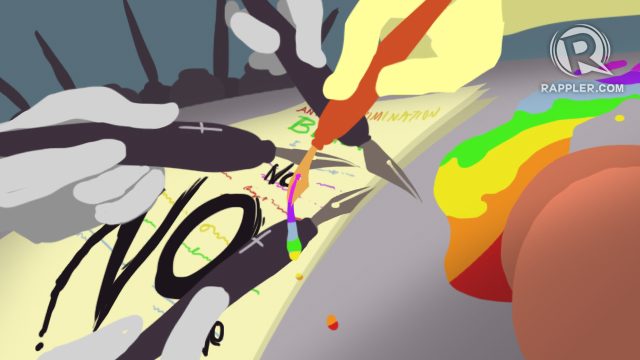
Why this law?
“The anti-discrimination bill is at a standstill,” said Ging Cristobal of the International Gay and Lesbian Human Rights Commission. “It’s being opposed by legislators who are pressured by the Catholic Church and Catholic denominations.”
Cristobal explained that most opposition groups think the bill would allow same-sex marriage. Existing versions of the bill, however, do not include such provision.
“In the far future, we’ll also have that [same-sex marriage],” said Cristobal. “But now, the priority is a bill securing education, jobs, and anti-discrimination.”
So what exactly is this bill?
Throughout Aquino’s term during the 15th and 16th Congress, various bills on LGBT discrimination have been filed, but none of them have passed.
The latest version, House Bill 5687, was approved by the committee on women and gender equality in February 2015. It prohibits all forms of SOGI-based discrimination and penalizes violators – with a fine of P100,000 to P500,000 or imprisonment of one to 6 years.
The bill also aims to give law enforcers gender awareness training, which will help them address hate crimes . Since 1996, the Philippines has had 164 documented cases. Several others go unreported.
The latest of such crimes is the murder of Jennifer Laude in October 2014. Until today, justice has yet to be served. Many other Filipinos, mostly nameless and faceless, have suffered the same fate as Laude.
Will the Philippines wait for another high-profile murder case before it acts?
HB 5687 consolidates previous bills with similar goals. A committee report was submitted in April, and is up for second reading, according to one of the bill’s principal authors, Dinagat Islands Representative Kaka Bag-ao.
“This is not only a triumph for the LGBT community, but for all Filipinos because the Anti-Discrimination Bill will protect the rights of each and every citizen regardless of their sexual orientation and gender identity,” Bag-ao told Rappler.
“It is high time that we create safer and more open spaces for Filipino LGBTs as we bring forth a culture of acceptance in our society. Congress has only one more year to get this done,” she added. The congresswoman is optimistic of the bill’s passage, as long as more Filipinos “will join the clamor.”
Meanwhile, the Comprehensive Anti-Discrimination Act has been pending in the Senate. It prohibits discrimination based on age, race, ethnicity, religion, sex, SOGI, among other factors like HIV status, relationship status, disability, language, phsyical features, health status and medical history.
“Any form of discrimination threatens order and stability in our country,” Senator Sonny Angara, the bill’s principal author, told Rappler.
“I am hoping that the Senate will start conducting a public hearing on the various anti-discrimination bills to get the ball rolling,” he continued.
Senators Bam Aquino, Grace Poe, Miriam Defensor Santiago, and Ramon Revilla Jr. have also filed similar bills in the past.
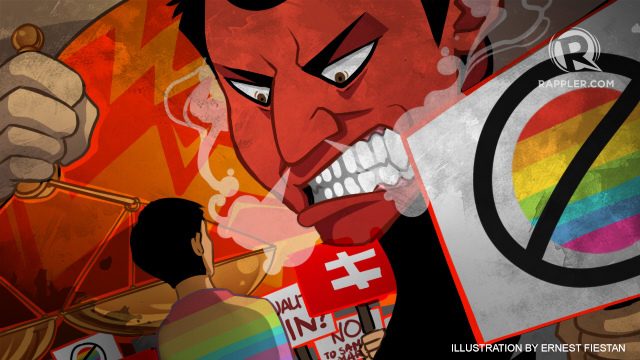
One of the first LGBT-related bills filed was a bill sponsored by Representative Rey Calalay in 1995, proposing to recognize the “third sex” as a sector. Then in 1999, the country’s first LGBT lobby group, Lesbian and Gay Legislative Advocacy Network (LAGABLAB), was formed. The group helped craft the anti-discrimination bill in 2000, as filed by Santiago and Akbayan Representative Eta Rosales.
Since then, different legislators have followed suit. Two decades later, however, a national law protecting LGBTs remains elusive.
Amid the long struggle is irony: Filipinos discrminating against a bill that hopes to end discrimination.
“We’ve been actively working for the passage of the bill. But the challenge mainly is that myths still exist in the mind of legislators,” said lawyer Marc Titus Cebreros, Commission on Human Rights executive director.
Some of these myths, advocates say, is spread by the likes of the Catholic Bishops Conference of the Philippines (CBCP).
“If a guy is born and he is attracted to guy, it’s a mistake,” Fr. Dave Clay, assistant executive secretary of the CBCP’s Commission on Family and Life, told Rappler. “When he is born, he should be attracted to women,” he added.
Despite selling these myths as facts, the CBCP says it supports the anti-discrimination bill, calling it a “gesture of charity.”
- Quezon City
- Angeles City
- Antipolo City
- Bacolod City
- Candon City
- Dagupan City
- San Julian of Eastern Samar
- Provinces of Agusan del Norte; and
On the upside, not all Filipinos of faith have taken a negative attitude towards LGBTs. Some have embraced the LGBT community with open arms .
In place of a national law, some local governments have also started implementing their own anti-discrimination ordinances .
On social media, however, not all Filipinos are supportive of such initiatives. Some call the proposed anti-discrimination law “special and unneccessary.”
But advocates like Cristobal counter: “LGBT rights are not special rights, just human rights.”
Such rights are sometimes disregarded not only by the LGBT community’s fellow Filipinos but also by their government, their churches, and even their families.
With only a year left in the current administration, a lot of advocates are losing hope with the anti-discrimination bill.
The next leader, advocates say, should act on what Philippine leaders have failed to realize in the past 20 years: Discrimination exists everywhere, but some people are more discriminated than others. – Rappler.com
Got stories to tell? Share your ideas and articles on gender and development with [email protected]. Speak up on #GenderIssues !
Add a comment
Please abide by Rappler's commenting guidelines .
There are no comments yet. Add your comment to start the conversation.
How does this make you feel?
Related Topics
Recommended stories, {{ item.sitename }}, {{ item.title }}.
Checking your Rappler+ subscription...
Upgrade to Rappler+ for exclusive content and unlimited access.
Why is it important to subscribe? Learn more
You are subscribed to Rappler+
Academia.edu no longer supports Internet Explorer.
To browse Academia.edu and the wider internet faster and more securely, please take a few seconds to upgrade your browser .
Enter the email address you signed up with and we'll email you a reset link.
- We're Hiring!
- Help Center

Towards an LGBT Rights: Reflecting on the Philippine Setting

The struggle to end discrimination against lesbian, gay, bisexual and transgender persons is a global challenge, and one that is central to the United States’ commitment to promoting human rights.” -United Stated President Barrack Obama (2011)
Related Papers
Erythrina Nicole , Magdalena Robinson
Bat of Gotham
Queer Politics and Human Rights: A Case Study of Homosexual and Transgender “Parlorista” in Iloilo City, Philippines
Justin Francis Bionat
This is a case study of the selected five (5) parlorista bakla who typically identify as either homosexual men or transgenders women in Iloilo City. Parloristas are typically seen as low-income “bakla” – a colloquial Filipino term that means effeminate homosexual men an transgender women. This study identifies and describes the socio-cultural and economic background of the selected participants, analyzes the forms of oppression and acts of discrimination that they experienced and identify the types of government support and legislation that can serve as basis for further human right programming in local settings in the Philippines. The research utilized queer politics as basis of analysis into the lived experiences of respondents with varying socio-cultural and economic backgrounds. Interviews were conducted and facilitated with the use of one questionnaire. Results have shown that the respondent's multi-faceted intersectional socio-cultural and economic backgrounds play a significant role in the acceptance of the participants in various settings. The participants’ socio-economic background, as well as, the discovery of self-identified sexual orientation, gender identity and expression (SOGIE). Parloristas have developed a tolerance of discrimination and have regarded it as common-day experience that does not need to be corrected or addressed to the proper authority or institution. The findings also suggest that government support and legislation are essential in protecting the rights of these populations because legal mechanisms are most effective in curtailing discrimination. This study takes on intersectional analysis as precursor to legal redress for the discrimination of sexual and gender minorities in the Philippines.
Anthony J Langlois
and Keywords This chapter commences by examining the status LGBT rights have achieved within the United Nations (UN) human rights system and reviews some key aspects of their trajectory. It considers how best to interpret the varying roles LGBT rights can play in the international system, given their new status, with a critical reading of Hillary Clinton's famous and much lauded "gay rights are human rights" speech to the UN General Assembly in 2011. It then moves on to what LGBT rights as human rights might mean in those parts of the world where this status receives little if any formal institutional recognition, using the case of the Southeast Asian region, where a new human rights regime has been established but where non-normative sexuality and gender have been willfully excluded from its remit. The chapter considers what the politics of human rights mean for sexuality and gender-diverse people in this region with reference to two senses in which human rights claims are political: (1) activists and advocates push against the status quo to have sexuality and gender issues included in the human rights discussion and (2) resistance to this inclusion is often played out by a politicization of sexuality and gender that obscures other pressing issues. This chapter demonstrates both the profound and important advances that have been made for LGBT individuals and communities and the ways in which these successes generate political dynamics of their own, which must be carefully navigated in order to sustain the emancipatory potential of the movement.
Unpublished Research Report
Nanang Zubaidi
Katherine Visconde
Jan Gabriel Castañeda
The report is the first in Southeast Asia and provides a summary of various human rights issues facing LGBTIQ people in the region. It highlights key human rights trends, such as the increasing criminalization and pathologization of LGBTIQ people amidst the rising influence of conservative social forces. The report likewise discusses the increasing threats against human rights defenders working on sexual orientation, gender identity and expression, and sex characteristics (SOGIESC). Persistent discrimination in accessing social services and protection are also discussed. The publication was officially launched as part of a series of events organized during the ASEAN Civil Society Conference / ASEAN People’s Forum (ACSC/APF) held in the Philippines on 10-14 November 2017.
Tin Gutierrez
Executive Summary 1 Transgender people are one of the most marginalized and neglected sectors in the Philippines in terms of human rights protection, promotion and fulfillment. Transpinays and transpinoys (transgender/transsexual women and men of Filipino descent) continue to face barriers in legal recognition, accessing education, employment, health care and public accommodations and in seeking redress as victims of violence and bias-motivated crimes. Up until the present, transgender Filipinos remain vulnerable to widespread discrimination based on their gender identity and gender expression. Filipino transmen and transwomen experience human rights violations perpetuated both by transphobic State and non-State actors.
Journal of Government & Civil Society
Jazztin Jairum Manalo
The study is drawn from the challenges and experiences of the LGBT individuals in the country experiencing discrimination and harassment due to marginalization which remained to create barriers to equality for LGBT people. The passing of Anti-Discrimination Ordinances in selected cities in Metro Manila is a triumph for many LGBT groups. The study shed light on comparison of Anti-Discrimination Ordinances and the existing LGBT ordinances between the selected local governments of Metro Manila in terms of its implementation and effects. It identified which among the local government units (LGUS) initiatives suits to be the best that may serve as model for other local governments in their future legislation of their own Anti-Discrimination Ordinance. The study utilized the Principal-Agent Theory to contextualize a situation in which local governments are involved. A qualitative comparative analysis that used key informant interviews and surveys is utilized in the study. Results presented that despite having the same composition and provisions when it comes to its enactment, Marikina, Manila, and Mandaluyong differ in ways and use of systems in terms of enforcement. Thus, the three LGUs may further establish mechanisms to monitor complaints of gender-based violence and provide guidelines in handling LGBT victims and may incorporate awareness-raising campaigns.
Lourenz Bontia
RELATED TOPICS
- We're Hiring!
- Help Center
- Find new research papers in:
- Health Sciences
- Earth Sciences
- Cognitive Science
- Mathematics
- Computer Science
- Academia ©2024
“We’re All Human, Right?”: Social Representations of LGBT + in Senate Hearings on the SOGIE Equality Bill in the Philippines
- Published: 06 March 2024
Cite this article

- Tristan B. Gamalinda 1 &
- Mira Alexis P. Ofreneo 1
149 Accesses
Explore all metrics
Introduction
The 2019 Senate hearings on the proposed anti-LGBT + discrimination legislation in the Philippines re-ignited the 20-year-long debate on LGBT + protection in a country both known as a “gay-friendly nation” (Kohut in Pew Research Center, 2013 ; Manalastas et al., 2017 ) and “the last bastion of conservative Catholicism in Asia” (Bloomer et al. in Policy Press, 2020 ). Prior studies have looked at various positions on the bill and how it was constructed to lobby for or oppose its passage. The present study contributes to the existing literature by looking at how LGBT + people are socially represented in these legislative debates—highlighting how public talk in political spaces has social and material consequences on LGBT + people.
The current study used archived livestream recordings of the 2019 Philippine Senate hearings and social representations theory (SRT) to explore how LGBT + people are socially represented by groups who are positioned as pro- and anti-SOGIE Equality Bill.
The results of this study show how the pro-Bill speakers focused on representing “LGBT + as human,” particularly as “normal humans,” “God’s creation,” “marginalized humans,” “exemplary marginalized humans,” and “productive members of society.” Meanwhile, anti-Bill speakers represented “LGBT + as wrong,” specifically as “just feelings, not fact,” “disordered condition,” “wrong lifestyle choice,” “harmful foreign ideology,” “social problem,” and “respectable without their LGBT + identities.”
Public talk in a political setting can (de)humanize LGBT + people, legitimizing both inclusionary and exclusionary social practices.
Policy Implications
Anchoring on social representations can direct how to shift future talks toward supporting the SOGIE Equality Bill and delegitimizing exclusionary practices.
This is a preview of subscription content, log in via an institution to check access.
Access this article
Price includes VAT (Russian Federation)
Instant access to the full article PDF.
Rent this article via DeepDyve
Institutional subscriptions
Similar content being viewed by others

Intersectionality: Race, Gender, Sexuality, and Class

“I Think Most of Society Hates Us”: A Qualitative Thematic Analysis of Interviews with Incels

Durkheim’s Theory of Social Solidarity and Social Rules
Availability of data and material.
Not applicable.
Code Availability
Abad, M. (2019). Timeline: SOGIE equality in the Philippines. Rappler . Retrieved November 29, 2020, from https://www.rappler.com/newsbreak/iq/238593-timeline-sogie-equality-philippines
ABS-CBN News. (2019a). Senators discuss SOGIE bill | News live [Video]. YouTube . Retrieved October 13, 2020, from https://www.youtube.com/watch?v=30ZCM7bAvBo
ABS-CBN News. (2019b). Trans woman detained after being harassed for using ladies’ toilet in QC mall. ABS-CBN News . Retrieved October 13, 2020, from https://news.abs-cbn.com/news/08/13/19/trans-woman-arrested-after-prevented-from-using-womens-comfort-room-in-qc-mall
American Psychological Association. (2017). Ethical principles of psychologists and code of conduct. Retrieved January 16, 2024, from https://www.apa.org/ethics/code
Asante, G. A. (2019). Anti-LGBT violence and the ambivalent (colonial) discourses of Ghanaian Pentecostalist-Charismatic church leaders. Howard Journal of Communication . https://doi.org/10.1080/10646175.2019.1590255
Article Google Scholar
Austria, C. S. R. (2004). The church, the state and women’s bodies in the context of religious fundamentalism in the Philippines. Reproductive Health Matters, 12 (24), 96–103. https://doi.org/10.1016/S0968-8080(04)24152-0
Ayoub, P. M. (2014). With arms wide shut: Threat perception, norm reception, and mobilized resistance to LGBT rights. Journal of Human Rights, 13 (3), 337–362. https://doi.org/10.1080/14754835.2014.919213
Bloomer, F., Pierson, C., & Claudio, S. E. (2020). Reimagining global abortion politics: A social justice perspective (1st ed.). Bristol: Policy Press. https://doi.org/10.2307/j.ctv80cc2f
Bordey, H. (2023). Villanueva sees no urgency in passing SOGIE bill. GMA News Online . Retrieved January 16, 2024, from https://www.gmanetwork.com/news/topstories/nation/872211/villanueva-sees-no-urgency-in-passing-sogie-bill/story/
Bosia, M. J. (2014). Strange fruit: Homophobia, the state, the politics of LGBT rights and capabilities. Journal of Human Rights, 13 (3), 256–273. https://doi.org/10.1080/14754835.2014.919217
Article ADS Google Scholar
Brandão, E. R., & Cabral, C. D. S. (2019). Sexual and reproductive rights under attack: The advance of political and moral conservatism in Brazil. Sexual and Reproductive Health Matters, 27 (2), 76–86. https://doi.org/10.1080/26410397.2019.1669338
Ceperiano, A. M., Santos, E. C., Jr., Alonzo, D. C. P., & Ofreneo, M. A. P. (2016). “Girl, Bi, Bakla, Tomboy”: The intersectionality of sexuality, gender, and class in urban poor contexts. Philippine Journal of Psychology, 49 (2), 5–34.
Google Scholar
Charles, C. A. D. (2011). Representations of homosexuality in Jamaica. Social and Economic Studies, 60 (1), 3–29.
MathSciNet Google Scholar
Cornelio, J., & Dagle, R. C. M. (2019). Weaponising religious freedom: Same-sex marriage and gender equality in the Philippines. Religion and Human Rights, 14 (2), 65–94. https://doi.org/10.1163/18710328-13021146
Cullamat, E. C., Zarate, C. I. T., & Gaite, F. R. (2019). An act prohibiting discrimination on the basis of sexual orientation and gender identity or expression (SOGIE) and providing penalties therefor. House of Representatives. Retrieved April 20, 2021, from http://www.congress.gov.ph/legisdocs/basic_18/HB00258.pdf
de Vela, M. T. C. (2017). Towards an enabling policy system for state inclusion of LGBT human rights: A discourse analysis of selected anti-discrimination bills [Unpublished doctoral dissertation]. University of the Philippines - National College of Public Administration and Governance, Quezon City.
Ferrari, F., & Mancini, T. (2020). Gender binary themata in social representations of sexual minoritites: A ten year scoping review. Sexuality & Culture, 24 , 2202–2229. https://doi.org/10.1007/s12119-020-09716-6
Fontanos, N. (2019). Media coverage on the proposed anti-discrimination legislation in the Philippines. Asian Politics & Policy, 11 (4), 701–705. https://doi.org/10.1111/aspp.12491
Ganna, A., Verweij, K. J. H., Nivard, M. G., Maier, R., Wedow, R., Busch, A. S., Abdellaoui, A., Guo, S., Sathirapongsasuti, J. F., 23andMe Research Team, Lichtenstein, P., Lundström, S., Långström, N., Auton, A., Harris, K. M., Beecham, G. W., Martin, E. R., Sanders, A. L., Perry, J. R. B., … Zietsch, B. P. (2019). Large-scale GWAS reveals insights into the genetic architecture of same-sex sexual behavior. Science, 365 (6456). https://doi.org/10.1126/science.aat7693
Garcia, J. N. C. (2021). Philippine gay culture: An update and a postcolonial autocritique. In M. Blasius & R. T. Chu (Eds.), More Tomboy, More Bakla Than We Admit: Insights into sexual and gender diversity in Philippine culture, history, and politics . Quezon City: Vibal Foundations Inc.
Gillespie, A. (2008). Social representations, alternative representations and semantic barriers. Journal for the Theory of Social Behavior, 38 (4), 375–391. https://doi.org/10.1111/j.1468-5914.2008.00376.x
GMANews.TV. (2008). CBCP head scores ‘DEATH’ bills in Congress. Retrieved October 13, 2020, from https://www.gmanetwork.com/news/news/nation/106120/cbcp-head-scores-death-bills-in-congress/story/
Gregorio, X. (2023). Philippines still overwhelmingly Catholic. Philstar.com. Retrieved January 16, 2024, from https://www.philstar.com/headlines/2023/02/22/2246855/philippines-still-overwhelmingly-catholic
Guitierrez, N. (2017). LGBTQ activists: We are tolerated but not accepted in the Philippines. Rappler.com . Retrieved October 13, 2020, from https://www.rappler.com/nation/170091-lgbtq-rights-philippines-tolerated-not-accepted/
Herek, G. M. (2010). Sexual orientation differences as deficits: Science and stigma in the history of American psychology. Perspectives in Psychological Science, 5 (6), 693–699. https://doi.org/10.1177/1745691610388770
Hontiveros, R., & De Lima, L. M. (2019). S. No. 159: An act prohibiting discrimination on the basis of sexual orientation and gender identity or expression (SOGIE) and providing penalties therefor. Senate of the Philippines. Retrieved April 20, 2021, from http://www.congress.gov.ph/legisdocs/basic_18/HB00258.pdf
Hontiveros, R., Legarda, L. B., & Villar, M. A. (2022). S. No. 1600: An act prohibiting discrimination on the basis of sexual orientation and gender identity or expression, or sexual characteristics (SOGIESC) and providing penalties therefor. Senate of the Philippines. Retrieved January 16, 2024, from http://legacy.senate.gov.ph/lisdata/4011636567!.pdf
Human Rights Watch. (2017). Just let us be: Discrimination against LGBT students in the Philippines . USA: Human Rights Watch.
Human Rights Watch. (2021). Malaysia: Government steps up attacks on LGBT people. Retrieved July 12, 2023, from https://www.hrw.org/news/2021/01/25/malaysia-government-steps-attacks-lgbt-people
Human Rights Watch. (2022a). Malaysia: State-backed discrimination harms LGBT people. Retrieved July 12, 2023, from https://www.hrw.org/news/2022/08/10/malaysia-state-backed-discrimination-harms-lgbt-people
Human Rights Watch. (2022b). Indonesia: New criminal code disastrous for rights. Retrieved July 12, 2023, from https://www.hrw.org/news/2022/12/08/indonesia-new-criminal-code-disastrous-rights
Knight, K. (2021). 77 lashes for gay couple in Indonesia: Troubling trend of anti-LGBT actions. Human Rights Watch. Retrieved July 12, 2023, from https://www.hrw.org/news/2021/01/28/77-lashes-gay-couple-indonesia
Kohut, A. (2013). The global divide on homosexuality: Greater acceptance in more secular and affluent countries. Pew Research Center . Retrieved from https://www.pewresearch.org/global/2013/06/04/the-global-divide-on-homosexuality/
Legaspi, A. (2019). Hontiveros: SOGIE bill still the best tool to protect LGBT Community. GMA News Online. Retrieved October 13, 2020, from https://www.gmanetwork.com/news/news/nation/707748/hontiveros-sogie-bill-still-the-best-tool-to-protect-lgbt-community/story/
Luz Gonzaga, L., da Silveira Praça, A. V., & Corrêa Lannes, D. R. (2014). As representações sociais acerca do gay entre estudantes da periferia do Rio de Janeiro. Revista Internacional Interdisciplinar INTERthesis, 11 (2), 162–182.
Manalastas, E. J., Ojanen, T. T., Torre, B. A., Ratanashevorn, R., Hong, B. C. C., Kumaresan, V., & Veeramuthu, V. (2017). Homonegativity in Southeast Asia: Attitudes towards lesbians and gay men in Indonesia, Malaysia, the Philippines, Singapore, Thailand, and Vietnam. Asia-Pacific Social Science Review, 17 (1), 25–33.
Martins-Silva, P. D. O., De Souza, E. M., Da Silva, J. A., Do Nascimento, D. B., & Balbi Neto, R. R. D. Q. (2012). Adolescents and homosexuality: Social representations and social identity. Cadernos de Pesquisa, 42 (146), 474–493. https://doi.org/10.1590/S0100-15742012000200009
Montiel, C. J., Umel, A., & de Leon, M. (2015). Discursive construction of political categories and moral fields: God versus rights and access in a reproductive health legislative debate. Political Psychology, 41 (4), 737–754. https://doi.org/10.1111/pops.12308
Nuñez-Mietz, F. G. (2019). Resisting human rights through securitization: Russia and Hungary against LGBT rights. Journal of Human Rights . https://doi.org/10.1080/14754835.2019.1647100
Placido, D. (2019). ‘It’s dangerous’: Groups say SOGIE equality bill discriminatory. ABS-CBN News. Retrieved October 13, 2020, from https://news.abs-cbn.com/news/09/04/19/its-dangerous-groups-say-sogie-equality-bill-discriminatory
Provencher, C. (2011). Towards a better understanding of cognitive polyphasia. Journal for the Theory of Social Behavior, 41 (4), 377–395. https://doi.org/10.1111/j.1468-5914.2011.00468.x
Radics, G. B. (2021). Challenging antisodomy laws in Singapore and the former British colonies of ASEAN. Journal of Human Rights, 20 (2), 211–227. https://doi.org/10.1080/14754835.2020.1841608
Rappler. (2019). Senate hearing on the SOGIE equality bill [Video]. YouTube . Retrieved October 13, 2020, from https://www.youtube.com/watch?v=LL1Wm7b9P5g
Rappler.com. (2018). Metro Manila Pride breaks records in Southeast Asia. Retrieved July 12, 2023, from https://www.rappler.com/moveph/206751-metro-manila-pride-march-records-southeast-asia/
Robles, R. (2012). If RH law passes, ‘D.E.A.T.H.S. bills’ next, warns Catholic Church official. ABS-CBN News . Retrieved November 2, 2020, from https://news.abs-cbn.com/blogs/insights/12/11/12/if-rh-law-passes-deaths-bills-are-next-warns-catholic-church-official
Senate of the Philippines. (n.d.). Senate Bill No. 159: Anti-Discrimination Act [PDF File]. Retrieved October 13, 2020, from https://www.senate.gov.ph/lis/bill_res.aspx?congress=18&q=SBN-159
Tan, M. L. (2001). Survival through pluralism: Emerging gay communities in the Philippines. Journal of Homosexuality, 40 (3–4), 117–142. https://doi.org/10.1300/J082v40n03_07
Article CAS PubMed Google Scholar
Tan, Y. (2019). Brunei implements stoning to death under anti-LGBT laws. BBC News. Retrieved July 12, 2023, from https://www.bbc.com/news/world-asia-47769964
Tubeza, P. C. (2013). PH ranks most gay-friendly in the world. Inquirer.net. Retrieved July 12, 2023, from https://globalnation.inquirer.net/76977/ph-ranks-among-most-gay-friendly-in-the-world
Vida, B. (2019). New waves of anti-sexual and reproductive health and rights strategies in the European Union: The anti-gender discourse in Hungary. Sexual and Reproductive Health Matters, 27 (2), 13–16. https://doi.org/10.1080/26410397.2019.1610281
Article PubMed Central Google Scholar
Wagner, W., Duveen, G., Farr, R., Jochelovitch, S., Lorenzi-Cioldi, F., Markova, I., & Rose, D. (1999). Theory and method of social representations. Asian Journal of Social Psychology, 2 , 95–125.
Wagner, W. (2015). Representation in action. In G. Sammut, E. Andreouli, G. Gaskell, & J. Valsiner (Eds.), The Cambridge handbook of social representations (pp. 12–28). Cambridge University Press.
Chapter Google Scholar
Wibawa, T. (2018). The Philippines is one of two countries where divorce is illegal, trapping women in marriages. ABC News . Retrieved July 12, 2023, from https://www.abc.net.au/news/2018-10-09/the-philippines-is-one-of-two-countries-where-divorce-is-illegal/10332600
Williams, C. C., Forbes, J. R., Placide, K., & Nicol, N. (2020). Religion, hate, love, and advocacy for LGBT human rights in Santa Lucia. Sexuality Research and Social Policy, 17 (4), 729–740. https://doi.org/10.1007/s13178-020-00429-x
Winskell, K., Sabben, G., Pruitt, K. L., Allen, K., Findlay, T., & Stephenson, R. (2017). Young Africans’ representations of the origins of same-sex attraction and implications for sexual and mental health. Culture, Health & Sexuality, 19 (3), 366–380.
Winskell, K., Sabben, G., Stephenson, R., Pruitt, K. L., Allen, K., & Findlay, T. (2018). From condemnation to normalization: Young Africans’ narratives about same-sex attraction and implications for communication and advocacy efforts. Global Public Health, 13 (7), 859–873.
Article PubMed Google Scholar
Yarcia, L. E., de Vela, T. C., & Tan, M. L. (2019). Queer identity and gender-related rights in post-colonial Philippines. Australian Journal of Asian Law, 20 (1), 265–275.
Yardley, L. (2008). Demonstrating validity in qualitative psychology. In J. Smith (Ed.), Qualitative psychology: A practical guide to research methods (pp. 235–251). SAGE Publications Inc.
Download references
Author information
Authors and affiliations.
Department of Psychology, Ateneo de Manila University, Quezon City, Philippines
Tristan B. Gamalinda & Mira Alexis P. Ofreneo
You can also search for this author in PubMed Google Scholar
Contributions
All authors contributed to the study conception and design. Literature review, data collection, and analysis were performed by TG and Dr. MO. The first draft of the manuscript was written by TG under the guidance of Dr. MO. All authors read and approved the final manuscript.
Corresponding author
Correspondence to Tristan B. Gamalinda .
Ethics declarations
Ethics approval.
The current study uses publicly accessible data as its data source. As such, it was granted an exemption from ethics review by the University Research Ethics Office of the Ateneo de Manila University.
Consent to Participate
Given the public nature of the data source, informed consent is not necessary.
Competing Interests
The authors declare no competing interests.
Additional information
Publisher's note.
Springer Nature remains neutral with regard to jurisdictional claims in published maps and institutional affiliations.
The authors recognize their reflexivity as members of the LGBT + Community who support the passage of the SOGIE Equality Bill.
Rights and permissions
Springer Nature or its licensor (e.g. a society or other partner) holds exclusive rights to this article under a publishing agreement with the author(s) or other rightsholder(s); author self-archiving of the accepted manuscript version of this article is solely governed by the terms of such publishing agreement and applicable law.
Reprints and permissions
About this article
Gamalinda, T.B., Ofreneo, M.A.P. “We’re All Human, Right?”: Social Representations of LGBT + in Senate Hearings on the SOGIE Equality Bill in the Philippines. Sex Res Soc Policy (2024). https://doi.org/10.1007/s13178-024-00953-0
Download citation
Accepted : 23 February 2024
Published : 06 March 2024
DOI : https://doi.org/10.1007/s13178-024-00953-0
Share this article
Anyone you share the following link with will be able to read this content:
Sorry, a shareable link is not currently available for this article.
Provided by the Springer Nature SharedIt content-sharing initiative
- Philippines
- Social representations
- Human rights
- LGBT rights
- Find a journal
- Publish with us
- Track your research

LGBT Rights In The Philippines: Everything You Should Know Before You Visit! 🇵🇭
Posted on Last updated: December 3, 2023
Categories LGBTQ+ Rights , Philippines
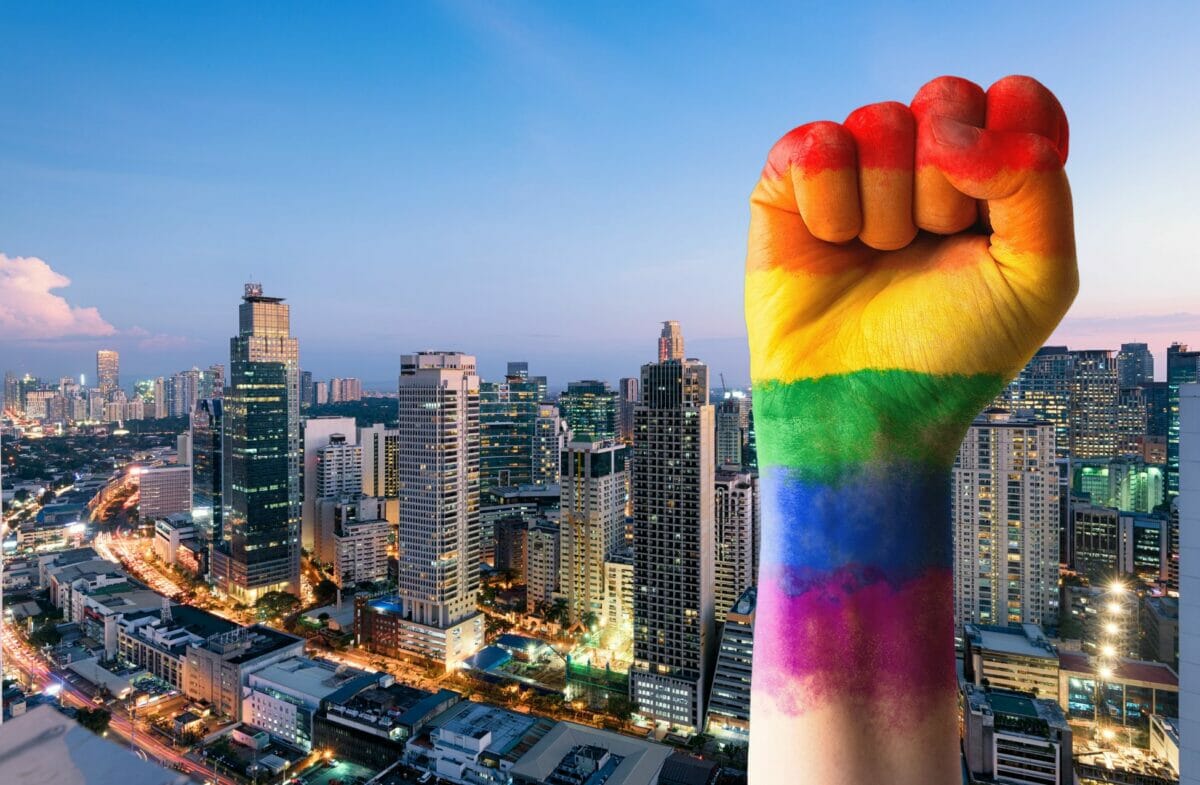
Cecilia Miller is a lesbian love warrior and educator fighting for queer justice and ensuring every shade of the rainbow shines bright & bold!
LGBT rights in the Philippines have a unique and diverse history, deeply rooted in the cultural fabric of the nation. Pre-colonial Philippine societies held positions of authority and prominence for individuals who identified as LGBTQ+, including cross-dressing males and transgender females taking on powerful roles as spiritual leaders or healers.
Despite this rich heritage, contemporary attitudes and protections for the LGBTQ+ community in the Philippines are still evolving, often posing challenges for both locals and tourists.
When visiting the Philippines, it is important for LGBTQ+ tourists to recognize that their experiences may differ from those of local community members. While the country might seem open and welcoming to some extent, tourists are urged to be cautious and aware of their surroundings, as it varies greatly from place to place, and individual experiences may vary.
To stay informed and protected, visitors should seek out the latest guidance and information from local LGBT advocacy groups and international human rights organizations, as it is essential to remember that situations can change quickly.
For the local LGBTQ+ community, strides are being made to enhance and implement legal protections and to combat homophobia and transphobia. Engaging in these efforts is crucial in order to create a safer and more inclusive environment for everyone.
Tourists can play their part by expressing support and maintaining a respectful and compassionate attitude during their travels. Remember to stay updated, exercise caution, and remain vigilant in embracing and celebrating the rich diversity of LGBTQ+ lives and experiences in the Philippines.
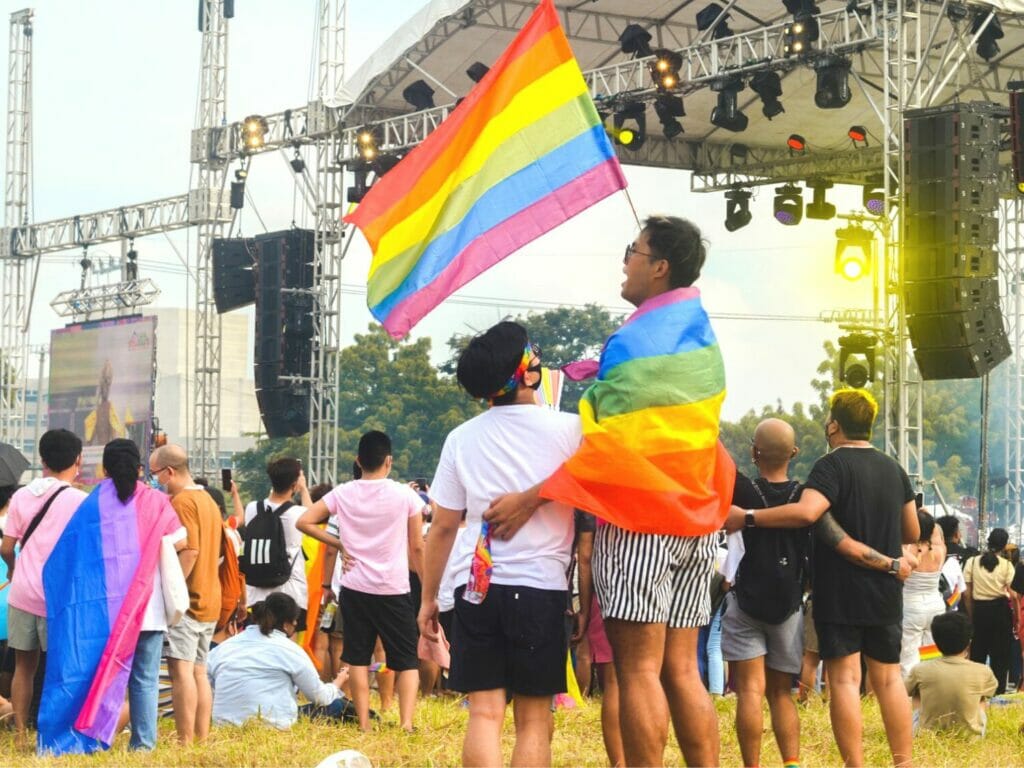
History Of LGBT Rights In The Philippines
The history of LGBT rights in the Philippines dates back to the pre-colonial era, when individuals who exhibited homosexual inclinations usually became babaylan—traditionally feminine shamans of the indigenous Philippine folk religions. These male-to-female shamans, known as asog or sometimes bayoguin or bayoc , played essential roles in their communities, representing the acceptance of gender-crossing practices.
On June 26, 1994, a significant milestone for the local LGBTQIA+ community occurred with the first LGBT Pride March in Manila , Philippines, which also marked the first such march in Asia. This event commemorated the 20th anniversary of the Stonewall Riot and signaled an increasing visibility of LGBTQ+ individuals in the country.
Since then, there have been multiple initiatives to support and uphold the rights of the LGBTQ+ community in the Philippines. Some of these efforts include the establishment of non-profit organizations such as Home for the Golden Gays , which provides a haven for elderly and homeless gay individuals.
Despite the substantial progress in terms of LGBTQ+ visibility and cultural acceptance, foreigners should remain cautious when traveling to the Philippines. It’s essential to stay updated with the current local climate and seek advice from relevant LGBTQ+ advocacy groups before making travel plans. Keep in mind that situations can change rapidly, and information may become outdated. Always remain vigilant and remember that bad actors can exist in any country.
In conclusion, the Philippines has a long history of supporting and accepting LGBTQ+ individuals to some extent. However, it is crucial for both locals and tourists to stay informed about the current situation and take any necessary steps to protect themselves. By maintaining a keen awareness and adhering to the guidelines from reliable sources and organizations, one can enjoy an exciting, inclusive, and safe experience in the Philippines.
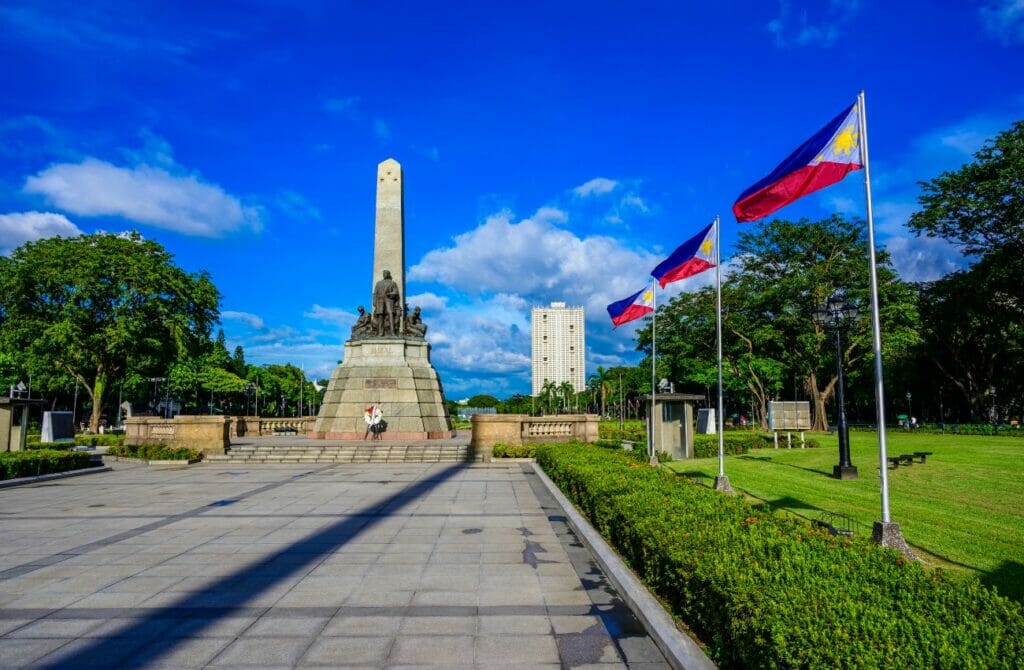
The LGBT Legal Situation In The Philippines
Great news! Homosexuality is legal in the Philippines. However, the legal landscape for LGBTQ+ individuals in the country still lacks certain protections. As of now, gay marriage remains unrecognized, and changing one’s gender is illegal. It’s important to remember that the situation can change, and it’s always wise to remain vigilant and seek current advice before traveling.
In terms of discrimination, the Philippines offers some protections for its LGBTQ+ citizens. Discrimination based on sexual orientation is illegal in some contexts, and employment discrimination is prohibited on the grounds of sexual orientation. Housing discrimination is also illegal, covering both sexual orientation and gender identity. Keep in mind that situations vary, and bad actors exist in every country, so stay cautious and be aware of your surroundings.
For both locals and tourists, life in the Philippines can be quite different. While the country is recognized as Southeast Asia’s most gay-friendly country, there is no specific law against LGBT discrimination. A study by the Philippine LGBT Chamber of Commerce noted that none of the 52 Philippine-based companies they surveyed in 2018 had policies against discrimination based on sexual orientation, gender identity, and expression (SOGIE).
To protect yourself and ensure a safe and enjoyable experience, it’s important to connect with local LGBTQ+ advocacy groups, such as the mentioned Philippine LGBT Chamber of Commerce, which can provide invaluable support and guidance. By doing so, you’ll have access to an invaluable network of information, resources, and allies.
Remember, the legal and social situation in the Philippines may be different from what you’re used to, but that doesn’t mean you can’t have an amazing time exploring this beautiful country and its diverse culture. Stay excited and embrace the adventure while always taking necessary precautions and staying informed on the current landscape of LGBTQ+ rights in the country.
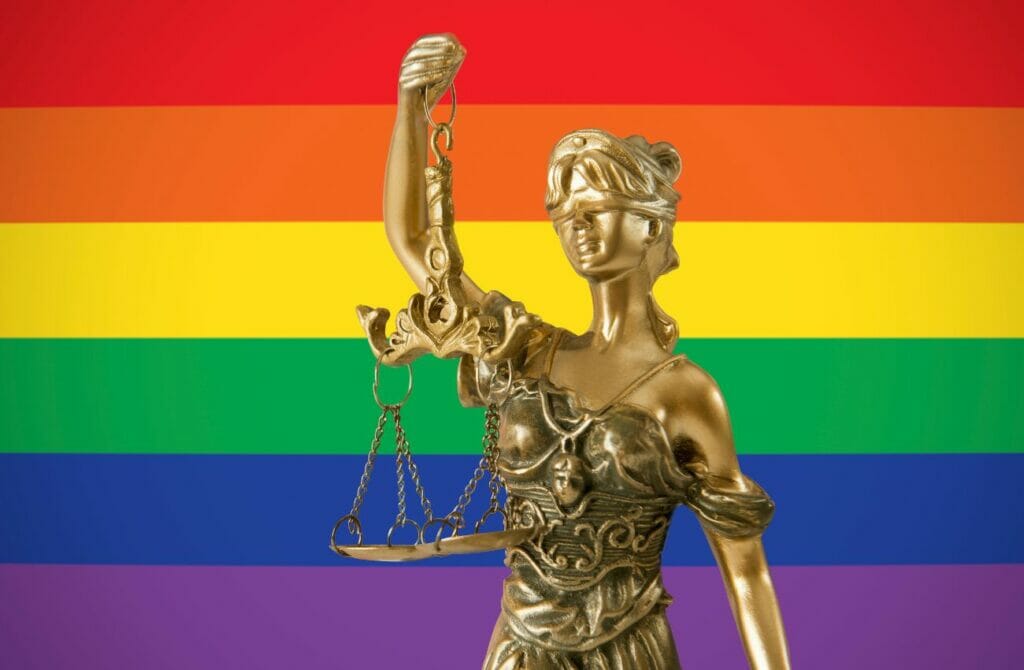
The LGBT Social Situation In The Philippines
The Philippines is known for its warm and welcoming culture, which extends to its LGBTQ+ community. The country ranks highest in the region for LGBT social acceptance according to a 2021 global index. However, it’s important for both locals and tourists alike to be aware that the legal landscape may not always align with the prevailing inclusive attitudes.
While the Philippine society is generally accepting of the LGBTQ+ community, there are still steps that can be taken to protect oneself. Staying informed about the local laws and regulations, as well as being aware of social cues and norms, are essential while navigating the social landscape. Always remain vigilant for potential bad actors, even in seemingly accepting environments, as these individuals can exist in any country.
It’s important for travelers and residents to stay up-to-date on the latest information regarding LGBTQ+ rights, as situations can change quickly. Seeking current advice before traveling or engaging in certain activities is a must to ensure both safety and respect for local customs.
In the spirited pursuit of rights and acceptance, local LGBT advocacy groups play a crucial role in the Philippines. Some prominent organizations include the Philippine LGBT Chambers of Commerce , Bahaghari , and Rainbow Rights Philippines . These groups work tirelessly to build support for the community, foster an inclusive environment, and push for progressive legislation.
By being informed, cautious, and respectful, the LGBTQ+ community in the Philippines can continue to thrive and enjoy the exciting social landscape the country has to offer. Remember to always be aware of your surroundings, seek current information, and support local advocacy groups in the quest for greater inclusivity.
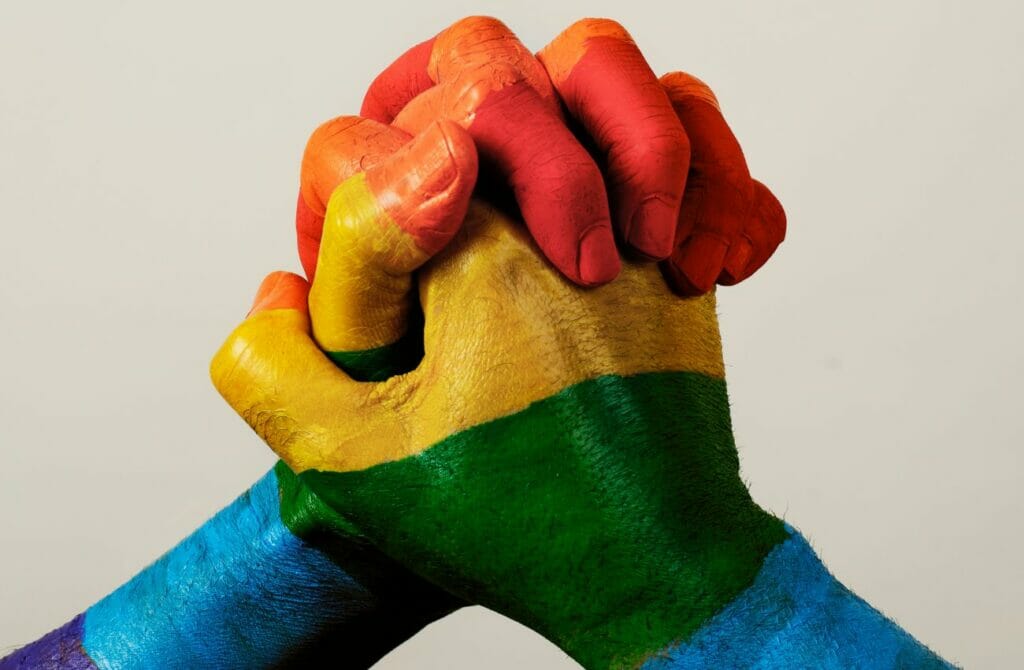
Trans Rights In The Philippines
The state of trans rights in the Philippines is a mixed picture. While progress has been made in certain areas, such as the growing visibility and acceptance of transgender individuals in Philippine society, there is still a long way to go in terms of legal protections and social acceptance for trans individuals.
Legal Protection and Discrimination
There is currently no national legislation in the Philippines that specifically protects LGBTQ individuals, including trans individuals, from discrimination. However, the Sexual Orientation and Gender Identity and Expression (SOGIE) Bill aims to address this issue by imposing fines or jail time on those who discriminate against LGBTQ individuals.
Safety and Vigilance
It is crucial for both locals and tourists to be aware of their surroundings and remain vigilant about their safety. While many people in the Philippines are LGBTQ-friendly and accepting, others may hold prejudiced views or even engage in discriminatory or violent behavior. Situations can change rapidly, so it is always best to seek up-to-date information and advice before traveling.
Advocacy Groups and Support
There are several organizations in the Philippines that actively promote LGBTQ rights, including the rights of trans individuals. Amnesty Philippines, for example, has worked on a variety of LGBTQ-related campaigns and initiatives with the goal of ending homophobia and transphobia and ensuring that everyone can express themselves freely.
Moving Forward: Positive Steps and Remaining Challenges
In order to improve the situation for trans individuals in the Philippines, it is essential to raise awareness, foster understanding, and encourage the adoption of non-discrimination policies and legislation. This can be done through education, community outreach, and continued advocacy on behalf of trans rights. Additionally, supporting existing LGBTQ advocacy groups and their efforts to promote a safer and more inclusive environment for all is essential.
Remember, it is crucial to stay informed about the current situation in the Philippines and take necessary precautions to protect yourself and others. Always bear in mind that situations can change fast, and it is important to seek current advice and support from trustworthy sources. Together, we can work towards a brighter future where all individuals, regardless of their gender identity, can live their lives freely and authentically.
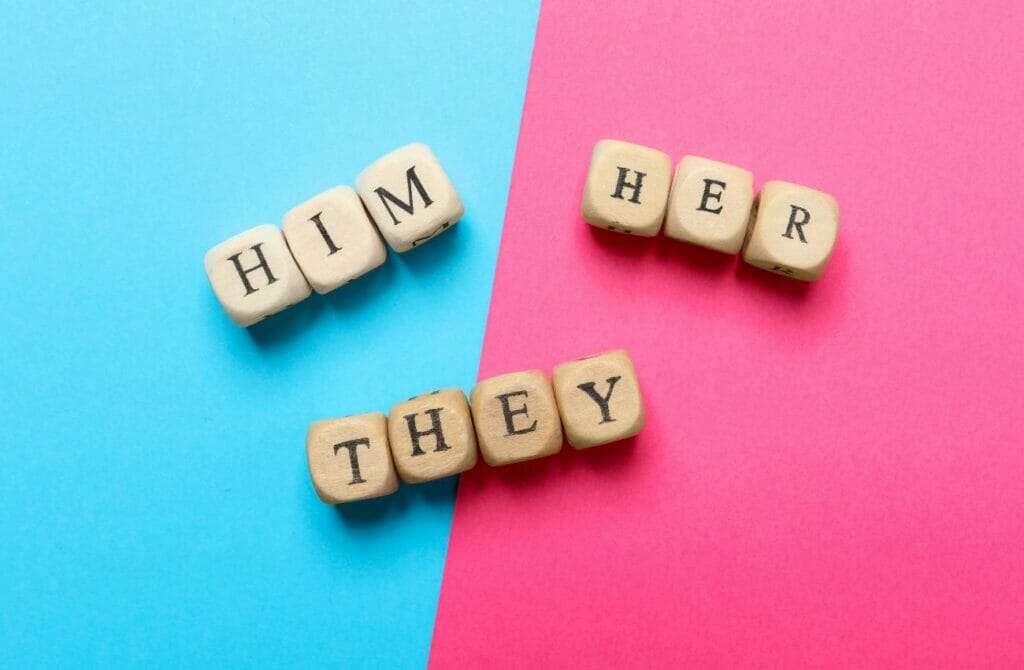
The Future For The Queer Community In The Philippines
The future of LGBT rights in the Philippines looks promising, with an increasing number of advocacy groups and activists working towards equal rights and protections for all. The country has seen some progress in recent years, such as the introduction of civil union bills in the Philippine Congress, which aim to recognize and provide benefits and protections to same-sex couples.
Despite these positive steps, LGBT locals and tourists may still experience discrimination and prejudice from time to time. To protect oneself, it is important to stay informed about local laws and the current situation regarding LGBT rights. Being aware of local customs and respecting cultural differences can also help minimize potential conflicts.
While there is momentum in the right direction, it is crucial for both locals and tourists to remain vigilant and cautious. Situations can change quickly, and information can become outdated. Therefore, always seek up-to-date advice before traveling or engaging in any activities that may be affected by the status of LGBT rights in the Philippines.
There are several LGBT advocacy groups in the Philippines that work tirelessly to improve the lives and rights of community members. By supporting organizations like Bahaghari Philippines, the local community and international visitors can contribute to the ongoing efforts towards equality and acceptance for all.
In conclusion, the future of LGBT rights in the Philippines is bright. With continued advocacy and growing support from both locals and the international community, the country is on a path toward greater equality and protection for all its residents.
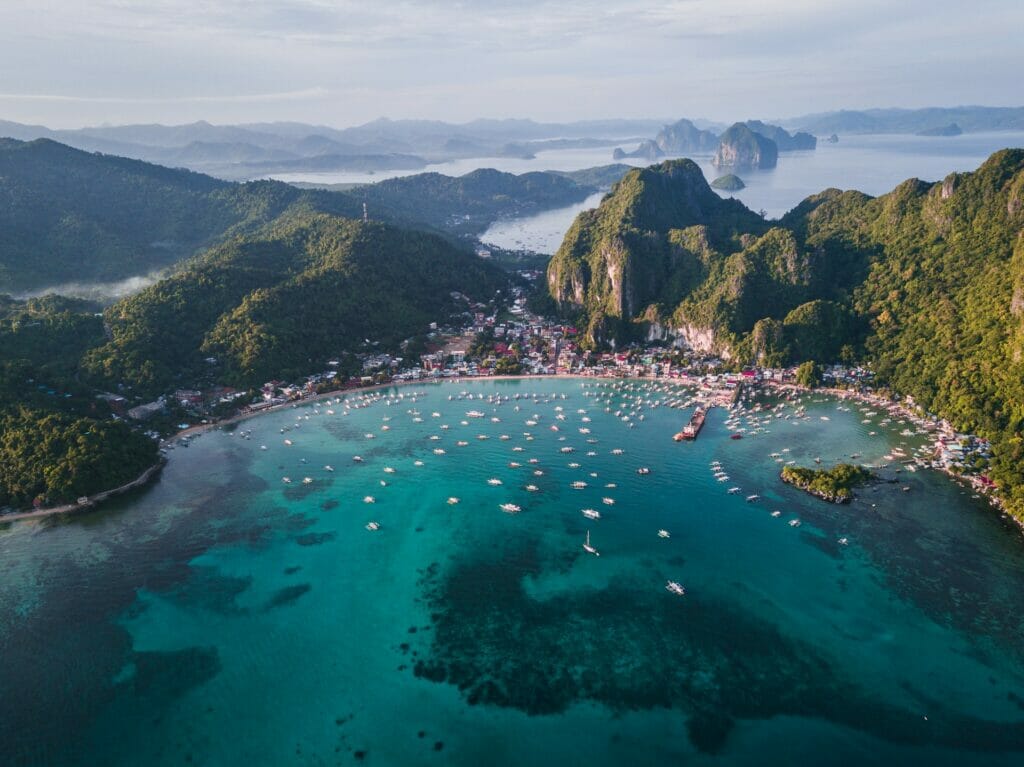
Protect Yourself While Travelling In Gay Philippines
LGBT rights in the Philippines have seen significant progress in recent years, but it’s essential to stay informed and exercise caution. This is true for both local individuals and tourists visiting the country. Excitingly, cities like Quezon City have implemented ordinances that protect LGBTQIA+ community members from discrimination in their residences, workplaces, and educational institutions.
However, it’s necessary to remember that situations can change quickly, and information can become outdated. So, always seek current advice before traveling or making any decisions related to your rights and protections. Stay vigilant, as there may be bad actors in any country, regardless of the overall positive developments.
To better protect yourself, consider taking the following precautionary steps:
Connect with local LGBTQIA+ advocacy groups, such as Amnesty Philippines or other community-supportive organizations. They can provide valuable information, resources, and support.
Be mindful of cultural and social attitudes and exercise discretion when expressing your identity in public, especially if you’re unfamiliar with the local environment.
Stay informed about the legal rights and protections for the LGBTQIA+ community. Familiarize yourself with laws and penalties related to discriminatory acts.
Make use of online resources, such as Being LGBT in Asia: The Philippine Country Report, that provide extensive details on LGBT rights in the Philippines.
Lastly, never forget the importance of remaining vigilant and informed in the face of evolving situations and potential challenges. Stay connected to relevant sources and advocacy groups to ensure you’re always up-to-date and well-equipped to navigate the unique challenges faced by the LGBTQIA+ community in the Philippines. Your excitement and enthusiasm for progress should always be accompanied by a commitment to safety, awareness, and support.
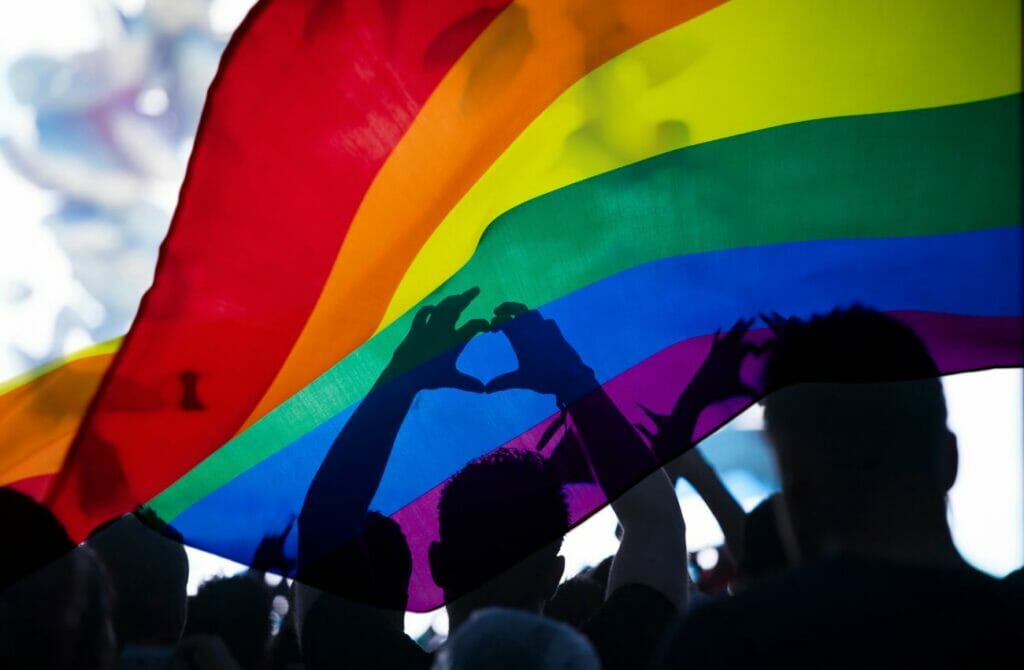

COMMENTS
Isinulat ni: Brixter M. Lanot Halos lahat ng miyembro ng LGBTQ ay nakararanas ng hindi patas na pagtrato dahil sa kanilang pagkilos at maging sa kanilang katangian. Sa madaling salita ito ay tinatawag na "Diskriminasyon". Nararanasan nila ito sa kanilang eskwelahan, sa kanilang komunidad, at ang ilan ay mismong sa kanilang tahanan. Ayon sa Human…
Dapat hayaan na lang nila kami. - T., 18-anyos na baklang estudyante sa hay-iskul sa Maynila, Pebrero 2017. Dapat na ligtas na lugar para sa lahat ang mga eskuwelahan. Pero sa Pilipinas, madalas ...
Discrimination Against LGBT Students in the Philippines. Download the full report. Download the summary and recommendations in Tagalog Gayunman, nagpapakita ang pananaliksik ng Human Rights Watch ...
A sexual orientation in which a person's primary sexual and romantic attractions are toward people of the same sex. Lesbian. A sexual orientation in which a woman is primarily sexually or ...
Banderang Bahaghari. Sa henerasyon ngayon, laganap ang salitang "LGBT" sa mga usap-usapan at kontrobersiya. Ito ay pinag-uusapan sa social media, sa balita, at maging sa mga tao mismo sa paligid. Ang LGBT ay inisyal ng lesbiyan, bakla, biseksuwal, at mga transgender. Ito ay isang komunidad nila na kung saan pinapalaganap, pinapahalagahan ...
Tignan naman natin kung gano kalala ang diskriminasyon sa Istados Unidos. Some schools in America are in the "Worst List: The Absolute Worst Campuses for LGBTQ Youth". Some of these schools ...
Sa Bostock v.Clayton County, Georgia, Blg. 17-1618 (S. Ct. Hunyo 15, 2020), sinabi ng Kataas-taasang Hukuman na ang pagpapaalis sa trabaho ng mga indibidwal dahil sa kanilang sekswal na oryentasyon o katayuan bilang transgender ay labag sa pagbabawal ng Titulo VII sa diskriminasyon dahil sa kasarian. Isinagawa ng Hukuman ang pagpapasya nito sa pamamagitan ng pagtuon sa simpleng teksto ng ...
Bonz Magsambol. MANILA, Philippines - The Filpino LGBTQ+ (lesbian, gay, bisexual, transgender, and queer) community's struggle for acceptance is far from over. (READ: The long road to an LGBT ...
This anti-LGBT prejudice and discrimination tend to be based on a rhetoric of moral condemnation and are fueled by ignorance or unfounded beliefs associating these gender expressions and sexual orientations with psychopathology or maladjustment. ... This means that Filipino psychologists should not discriminate against or demean persons based ...
Lesbian, gay, bisexual and transgender people (LGBT) in the Philippines face legal challenges not faced by non-LGBT people, with numerous anti-discrimination legislations, bills and laws that are struggling to be passed on a national level to protect LGBT rights nationwide, with some parts of the country only existing on a local government level. LGBT individuals in the Philippines are often ...
However, it is reported that Filipino Lesbian, Gay, Transgender and Bisexual (LGBT) community, especially LGBT students are struggling with bullying and discrimination from families, communities ...
The Tagalog word eludes Western concepts of gender and sexuality—and offers a window into LGBTQ+ Filipinos' quest for acceptance. By Jaime Oscar M. Salazar, a writer who lives in Pasig ...
June 30, 2023 7:00 AM EDT. A t first glance, the deeply Catholic Philippines can seem surprisingly LGBT-friendly. In a nation of 110 million people, more than 110,000 showed up last week to Quezon ...
Ang LGBT ay inisyal na nagsasamang tumutukoy sa mga taong "lesbiyana, gay, biseksuwal, at mga transgender" (tomboy, bakla, dalawang kasarian, at mga nagpalit ng kasarian).Ginagamit na ito simula pa noong dekada '90, na hango sa inisyal na "LGB", at upang palitan ang pariralang "pamayanan ng mga bakla", na ginamit noong dekada '80, na kung saan marami sa napapaloob sa komunidad ang nadama na ...
During the 2016 presidential campaign, too, Rodrigo Duterte vocally condemned bullying and discrimination against LGBT people. ... Gay Filipino Comes Into His Own. Most Viewed June 24, 2022 Q & A
The Fuller Project—a global nonprofit newsroom dedicated to groundbreaking reports on women—said in an article published in January 2021 that around 50 transgender or gender nonbinary ...
The 2019 SWS survey added that 60% of Filipinos agree that the LGBT community experience discrimination and 55% are in favor of passing the law protecting their rights. But there are reservations with this support: 47% think transgenders shouldn't be allowed in female restrooms and 48% do not agree that they should be allowed to change their ...
This is a story about the Filipino people's struggle for genuine equality and acceptance, amid a culture of hate and holiness ... The long road to an LGBT anti-discrimination law. Jul 29, 2015 11: ...
CONCLUSION This paper seeks to identify the factors that hinders the implementation of the Anti-discrimination bill that protects the welfare and development of the Filipino LGBT groups. Also, this work promotes understanding on the legal and social environment faced by lesbian, gay, bisexual and transgender (LGBT) people in the Philippines.
Introduction The 2019 Senate hearings on the proposed anti-LGBT + discrimination legislation in the Philippines re-ignited the 20-year-long debate on LGBT + protection in a country both known as a "gay-friendly nation" (Kohut in Pew Research Center, 2013; Manalastas et al., 2017) and "the last bastion of conservative Catholicism in Asia" (Bloomer et al. in Policy Press, 2020). Prior ...
Diskriminasyon Batay sa Kasarian. Ang diskriminasyon batay sa kasarian ay nauugnay sa hindi kanais-nais na pagturing sa isang tao (aplikante o empleyado) dahil sa kasarian ng taong iyon, kasama ang seksuwal na oryentasyon, pagkakakilanlan sa kasarian, o pagbubuntis ng taong iyon. Ang diskriminasyon laban sa indibidwal dahil sa pagkakakilanlan ...
As of now, gay marriage remains unrecognized, and changing one's gender is illegal. It's important to remember that the situation can change, and it's always wise to remain vigilant and seek current advice before traveling. In terms of discrimination, the Philippines offers some protections for its LGBTQ+ citizens.
Discrimination can lead to mental health issues that include depression, stress, drug and substance abuse, anxiety and the worst scenarios being suicidal thoughts, attempts or death.